#is very often rooted in a sense of powerlessness
Text
Monkey King 2009 Episode 11
Ohhhh I really liked this one.
First, I have to say it, comparing the four generals now to Episode 1, they have come a long way. At least in regards to the tactical side of their jobs (they should still not at all be directly responsible for children). When they thought the enemy had found their camp and were closing in, they were on their shit. Marshal Ma was snapping out orders immediately, no one was contradicting anyone else or squabbling or anything, and it was definitely a Sign Of Growth.
Or the major and repeated servings of humble pie they've been swallowing recently. Active war will probably do that to you, especially when you can't blame your scapegoat for your failures after you ran him off.
Also once again showcasing their highly conditional displays of respect and goodwill. Stone Monkey pops back up with Six Ears and he's being called a "Little Hero" now, huh? You literally drove him out of the troop to his possible death and didn't care much at all not that long ago, my guys. We all saw you. You can't fool us.
And, eyyyy, Six Ears. Buddy. Bud.
Oh no.
I can see where it's coming from, is the thing. He used to be the kid pulling off the stupidly risky feats and being praised and rewarded for it. "Earning his place". The sacrificial lamb to Stone Monkey's scapegoat. Neither is a great role to be filling, but Six Ears doesn't know that, and the life of a sacrificial lamb probably still looks a whole heck of a lot better when you're looking at it from the place of the scapegoat. And now it looks like Stone Monkey's taking his place, right, and without that...where does he fit? He knows how conditional the approval of the four generals is, and at the start of the series he dealt with their hot-and-cold reception of him by flippantly ignoring it, but he did experience it. Stone Monkey has had it "worse", but Six Ears isn't so far removed from it that he can't easily imagine himself being in Stone Monkey's place, I'd think. So it's no real wonder he's territorial of his "place" in the troop, feels like the four generals', the troop's, (and possible Old Monkey King's) regard is a finite resource, and reacts badly to feeling like it's all being "stolen". Jealousy is rooted in insecurity, and Six Ears has absolute heaps of that.
And speaking of insecurity, it's also worth noting that he keeps continuously being captured and having his autonomy and ability to protect himself removed, over and over and over again, and this time he was almost tortured. By having his ears cut off while he was tied down and unable to fight back. We don't know how long it took the kids to track down the troop again, but since we're meant to assume the entirety of the surviving troop made it to the cave, the commanders would have needed to have at least enough to time to track the scattered groups down. In that case I'd imagine this is several days later at least, but still only days. Maybe a week or two at most. Six Ears probably hasn't had the time to really process what almost happened to him, but it would still be there in his head. He also, unfortunately, didn't have a whole lot of agency in his own rescue either, so that lack of control, that lack of feeling like he can keep himself safe, and shame at his own helplessness has got to be eating him alive. Take the above belief that he needs to earn his troop's support or risk losing it entirely with the fact it's very unlikely this kid has actually felt safe anytime in a very long time, not since the Demon King's incursions first really started honestly, and Six Ears is definitely not going to be doing well. So double up that insecurity and set it on fire with a heaping spoonful of desperation and you probably have Six Ears's emotional state right now.
*sigh*
He's definitely going to pull some shit, basically.
And holy cow someone actually called General Beng out on his pretentious language. General Ba was NOT having it. I actually almost kinda felt bad for General Beng. He's just trying to make his report, starts tripping over his literary references, and General Ba comes out swinging immediately. "Come ON. Do you think we have the time for you to be pulling out this grandparent talk?! SIT DOWN." And General Beng is like "):".
Like, harsh, General Ba. Fair! But dang. It wasn't the time at all, but General Beng trying to comfort himself by falling back on his quotes and poetry was actually kind of, I don't know, sad. Everyone is just really upset here. General Beng's trying to self-soothe, General Ba is lashing out, and the Marshals are...uh...dissociating back there? (Hey, actually, yeah, Marshals, why are you letting your generals struggle through delivering this very important report to the king instead of doing it for them? Or swooping in at least, when they fumble? What do you even DO?)
And I'm not 100% sure, but General Ba also seems to make a pun on General Beng's stuttering over 此乃 (fancy schmancy "this is")? Or at least that's how I read it, and it kind of made me laugh. Honestly my Chinese isn't good enough to catch most wordplay, so I could also be barking up the wrong tree entirely, in which case, don't mind me. I'm still gonna giggle at it, though. (General Beng: "This g-, uh, This g-" General Ba: "This GRANDMA.")
General Ba even liked that turn of phrase so much he repeated it again later. Poor General Beng will never be able to use his beloved 此 in General Ba's hearing ever again without having "How's it feel being a GRANDMA" yelled at him immediately.
But honestly, General Ba is pulling zero punches here. He's genuinely rattled, since he's finishing General Beng's report for him by going, "Look, fancy language or no fancy language, all I know is we took everyone to the back of the mountain and the enemy was already there. They are everywhere. We have nowhere to go and we are fucking dead." He also has this really haunted look to him. General Beng is only the first casualty. General Ba has looked death in the eyes and is going a bit feral about it. No one is safe.
Plus that one monkey soldier coming back and breaking down in tears because "the monkeys without weapons are getting the worst of it...they had to run away."
"Run away". Right.
Listen, guys. Just say they died. We understand.
I'm actually noticing this cartoon is fine with having soldiers screaming KILL THEM ALL with no hesitation, graphic death threats abound, but they don't like admitting anyone actually died. Especially not the monkeys. I think that's a bit of an odd line to draw, but I'll respect it.
(They definitely died, though. Those tears tell all. Non-combatants led around to the back of the mountain and straight to their deaths, I guess. Yikes.)
Bless Ginseng Fruit for trying to defend the boundaries in Stone Monkey's life. By creating boundaries for him without Stone Monkey's input or approval <3 "It's fine," says Ginseng Fruit. "He only needs boundaries with other people. I'm different." Godspeed you weirdly intense little fruit. Glad Stone Monkey has a handle on that, generally by means of straight up covering Ginseng Fruit's mouth and doing whatever it was he was going to do anyway. I guess if it works for them it's fine?
Also appreciated Stone Monkey leading them all to the waterfall and then his face that perfectly speaks to the fact that Stone Monkey is having the abrupt realization that his last time entering this cave was a complete accident caused by reckless use of logs and a total shattering of the laws of physics he isn't positive he can repeat. Do you think he imagined asking Marshal Ma to surf a log up the river and just crash straight into the waterfall, no, really, it'll be fine, for approximately two seconds before his brain shut down on itself in self-defense and also despair? Absolute gold.
And the writers slipping in a little reminder of the tenuous and fickle regard of the troop by having a few of the soldiers immediately ready to believe the worst of Stone Monkey right then and there. Thanks, writers. We might have forgotten.
Not gonna lie, I was looking at the Demon King's army in slight confusion wondering at some of these character designs (the artists are actually usually pretty good about using familiar character models for every crowd shot, so the new guys stood out), before I remembered that Demon King had the great idea to issue a fake decree in Heaven's name. OH, went I. HA.
I mean, I'm sure that's not going to backfire spectacularly in any way at all. Heaven probably loves having random demons lying and using their authority to stir up trouble only to then point the agitated results of their tomfoolery right to their doorstep. Everyone loves having their name dragged into a fraud case!
But also...okay, jumping topics entirely, but why couldn't anyone just jump back and grab Sixth Eldest? Any one of those guys could have made the jump there and back in half the time it took the kid to finally do it himself. Yes, of course, "but the tension!" or whatever. I call contrived. As far as I'm concerned, the only one with an excuse was the one monkey apparently responsible for handling six children by herself. What was she going to do? Toss the one baby to save the other baby? She's got her hands full.
Watching Sixth Eldest make that jump though, I was just thinking the whole time: Wow. How much would it suck to be the reason your entire community was overrun by murderous enemy forces? As it is, this kid is probably going to be hearing this story at every drunken feast for the rest of his entire life. RIP, little buddy. (I'm also counting children and if Yellow Flower Monkey has six kids to look after total, that means Sixth Eldest is the youngest. Who's the kid being held in her arms, then?! Why's the littlest kid out there toddling over sheer drops and water-slick rocks by himself while this baby gets the VIP ride? Is it...*gasp* favoritism? Yellow Flower Monkey's secret dark side?!? /j)
Old Monkey King excitedly waxing poetic about Water Curtain Cave, though? Cute. Super cute. He was incredibly excited and I don't think we've ever seen him this tickled. It was amazing.
None of the adults actually bothering with rationing until after the food was already gone, though? Less cute. They even called themselves out!
"It's better not to wait until these kind of things become a problem to sort out a solution."
*sage nodding*
*cut to elderly monkeys literally collapsing from hunger just down the hill*
"By which I mean, it would be better, but all the food is already gone."
"WHAT."
And it can't just have been gone either, since people aren't generally out here just immediately collapsing from hunger the second the the last fruit is plucked off the branch. Even if they are elderly. How long were they out of food before they had a meeting about it? Guys. I just said you were getting your shit together.
Ginseng Fruit, reading the room and dragging Stone Monkey away before he can volunteer to feed the whole troop from enemy-infested territory single-handedly, pointing a very stern finger at him: "No...nO..."
Stone Monkey: UGH. I KNOW. I wasn't GOING-
*aforementioned collapsing elders and Yellow Flower Monkey (again)*
Stone Monkey: ...to WAIT. Off I go, I guess! See you later, Ginseng Fruit. Hold down the fort while I'm gone, okay?
Ginseng Fruit is over here running their hands down their face shaking and screaming violently on the inside, I bet. If they'd seen that elder go down before Stone Monkey did, they absolutely would have buried the poor man alive, I'm sure. Like shoving a mess you don't want your guests to see in the closet. Except with a living person. And mounds of cold, wet Earth reminiscent of a shallow grave. Look, all's fair in love (/platonic) and Not Letting Your Favorite Person Die For The People Who Left Him To Die Regardless Of His Feelings On The Matter war. Sorry, old man. Nothing personal. (I do not actually think they would have done this, but I do think it would have crossed their mind. Let Ginseng Fruit be a little unhinged. It's funny.)
On a sidenote, gotta appreciate the old man for apparently recognizing their limited food supply well in advance of anyone else and taking care to make sure the young got what they could while they could. What a guy. I like that guy.
Six Ears...definitely has ulterior motives for going with Stone Monkey, but also this is still the kid who took it upon himself to hunt Stone Monkey down every time he took off by himself on dangerous missions in the past too, so him going through the old song and dance of noticing Stone Monkey was just straight gone without a word halfway through a conversation (Stone Monkey will never outgrow that, will he? Lol) and knowing from experience that Stone Monkey was definitely off to Solve The Problem and promptly running after him is basically their old dynamic in its entirety.
It's just...sad now. Because Six Ears is definitely going to be making some bad choices and do something that's going to hurt because he's hurting and it's going to suck and I don't wanna see it. And meanwhile Stone Monkey's just happy to have Six Ears with him.
I love them ):
Stone Monkey actually noticing Six Ears being kind of subdued once they're out of the cave, though! My boy! He never does that! Or at least, that's how I interpreted it since there's an animation of him jumping up to walk next to Six Ears, who is frowning at the ground, and the animation has him glance sideways at him, look away, glance sideways again, and then away again. And he's also frowning the same way. They did that on purpose! Tell me Stone Monkey isn't noticing something.
But of course they're interrupted before it can go anywhere. Ergh.
#mhw09 personal#this is long but there is SO MUCH this episode and I LOVE IT#six ears ayyyyy kiddo ):#his issues are coming to a head. Most of how I think about it is like#primarily rooted in the fact that trauma in general and PTSD in specific#is very often rooted in a sense of powerlessness#a lack of ability to save yourself or control the situation that hurt you. And if Six Ears hasn't developed PTSD already#I'm almost certain he WILL#he's definitely got some form of compounding trauma that's prompting him to overreact in trying to cling to and control his life#re-establish familiar things and routines#he's still making his own choices here and that's going to be on him. but.#it's just sad watching how the fear is getting to him. and how he's letting it poison his strongest bond ):#oh almost forgot to mention that I like that they managed to work in the finding and accessing of water curtain cave still being the impetu#for Stone Monkey becoming Monkey King#sure sucks they had to wrap in a whole subplot around the fact that being Old Monkey King's heir was strongly hinted to Six Ears to be HIS#future#for most of his entire life#and I'm sure there's no way he's going to see this as yet another threat to his place in the troop (and therefore safety and well-being)#I'm sure he'll handle it with grace and zero overreacting panic and anger whatsoever#and by sucks I mean “Ow. Ow this is going to hurt. But good job writer people. But ow.”#anyway I need to go to bed
0 notes
Text
I believe very strongly that if you want to be an ally to marginalized groups, you should absolutely read and watch material bigoted against them.
This is because one of the big things that radicalization pipelines benefit from is the principle I've seen framed as "milk before meat", where they feed you palatable, easily digestible ideas, often with a kernel of truth, in order to work you up to the core of the bigoted ideology. If you go to the meat first, you will choke on it. This will make you more easily able to spot it when they try to feed you the milk, and more resistant because you know the meat it's building up to.
There are two keys. First, you need to start with the meat, and second, you need to read it with a sharply critical eye.
If you're looking to read something fatphobic, for example, Harry Potter may be a great mainstream example, but it's in a way that is so culturally acceptable that it can slip by if you aren't looking for it. "None For You: How Fat People Are Ruining America and the Planet and What You Can Do About It", on the other hand, is rather obvious in its biases, allowing an amateur to see them clearly for easier interrogation of the premise. Most bigoted material can be acquired by piracy or through your local library. This is one of the big reasons that libraries stock bigoted material.
Then, start noting down all of the things that the material says that seem to make sense, or that you are sure are true. There's no shame in this. Bigoted ideas are ingrained in your upbringing, and on top of this, a lot of bigots will take real problems and build on them in ways that are bigoted.
For instance, anti-immigrant sentiment in the USA is often bolstered by the fact that wages in the USA are effectively decreasing, along with job security. They say that this is because immigrants are taking the jobs, decreasing the amount of value that is available to USAmericans. To a USAmerican who does not know much about immigrants, but does know that their paycheck buys less and less, this sounds like a plausible explanation.
Then, later, look up exactly what they are saying. What are the real issues? (Racism and unchecked capitalism.) Why are they being used to bolster this argument? (Because it takes the heat off of powerful people and puts it on powerless ones, redirecting the hate to people it can more easily hurt, which satisfies the rage of the USAmerican, drives a wedge between them and immigrants, and takes heat off of the powerful.) What are real ways to tackle the real issue? (Solidarity with immigrant workers, especially undocumented ones, unions, and working for better social safety nets.) Why did I fall for that? (You did not have enough information.) Can I notice this rhetoric in the future and avoid falling for it? (Yes.)
Know that many of the ideas you encounter will be normal. Much bigotry is normal. Normal is not automatically good or right.
Know that there will be useful ideas interspersed with some bigotry. A lot of people with useful ideas have been bigots. This does not mean we must discard their ideas, nor that we must accept the bigotry. It does mean that we need to critically examine the ideas to see if they are rooted in and/or affected by the bigotry, and if it is possible to effectively remove them from their bigoted origins, or if the bigotry is so wound into the ideas that they is no longer useful if you wish to avoid harming the group the thinker was bigoted against.
This is difficult work to do. It is intellectually intensive, and emotionally exhausting. You will start seeing bigotry in all kinds of places, including media you thought of as "good" and "progressive", and that will also be emotionally exhausting and dispiriting. It will also mean that you are no longer passively absorbing those bigoted ideas because you settled on the idea that this media is "good" and that as long as you only consume "good" media, you will be free of bigoted ideas- a premise that is disturbingly popular for how incorrect it is. Knowing how to recognize and discard bigotry in works is far, far more useful than flatly refusing to consume more overtly bigoted works.
One way to make it easier is to form reading groups, so that you can lean on each other when reading something that's affecting you badly. It also means that there's more than one person processing the bigotry, so other people might notice more subtle parts of the bigotry that slipped past you in your own reading, allowing you to have a fuller picture of the book. If you can't form a reading group, more famous bigoted works often have criticism available online for you to read through. Remember to do your own research. What makes doing this so valuable is increasing your own ability to detect bigotry and to think critically about material you are consuming.
You do not have to limit yourself to traditional media, either. There are forums and social media bubbles that are hotbeds of bubbling, seething bigotry that is more extreme and repugnant than the vast majority of published work. Reading these conversations can be useful for the exact same reasons that reading overtly bigoted books, articles, letters, and essays can be, and they often contain more up to date dogwhistles. However, this is a riskier move. Social media is built to make you keep scrolling, and you can easily find yourself at your wits end and vulnerable to a bigot whose rhetoric is slightly less obvious than the others. In addition, it can be tempting to interact- at which point the bigots will either attack you or try to recruit you, both of which are damaging to you. Only read the conversations of bigots if you are well supported and have strong impulse control, and read them in small doses.
You are not immune to propaganda, but you can partially inoculate yourself into being less vulnerable by consuming it in controlled circumstances that match your ability to recognize it as such and reject it.
2K notes
·
View notes
Text
Review: Wish (2023) [SPOILERS]
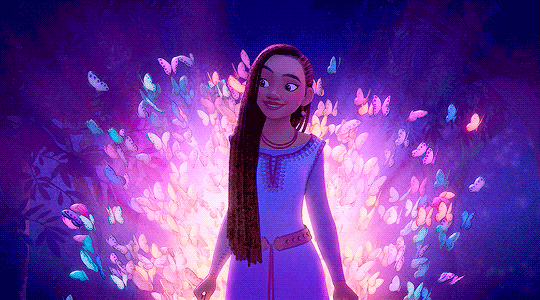
Evening, everyone! Tonight my mother and I went to go see Disney's most recent film, Wish, which fortunately came to theaters in my area right before its formal American release date. I'd been very curious to see how this tribute to Disney's last 100 years of filmmaking would turn out, and now that I've seen it...well, I have to be honest, I was a little disappointed. I want to be very clear both that I was going into this with a rather sunny outlook and that there are things I really liked in this film...but overall, it felt like a lot of the good ideas it had were only half-baked, and I found myself -- forgive me -- "wishing for something more" than what we got.
For a more comprehensive deep-dive...a cut!
The Good!
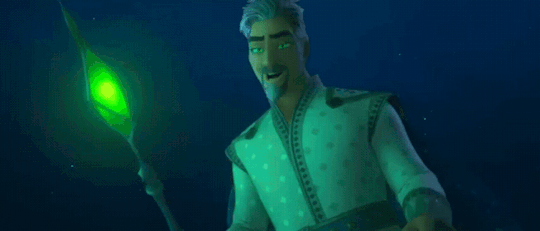
+The single best element in this film for me was Chris Pine's performance as our villain, Magnifico. There are definitely some things I can critique about Magnifico's overall storyline and "character arc" further down, but Chris was clearly having a grand old time being an egotistical, sassy jerkwad, and it totally showed. Even in his villain song This is The Thanks I Get?, which just screamed "passive-aggressive abusive parent," you can hear how much fun Chris was having in the studio, recording it. I just about always enjoyed when Magnifico was on screen, and I actually did really like the idea that a lot of his villainy is rooted in him being obsessed with control over everyone and everything. In a weird way, Magnifico's turn to the Dark Side parallels Anakin Skywalker's in the sense that he lost so much in the past that he's determined to never lose anything important to him again -- especially the power he's accrued to make himself feel strong, after having felt so powerless. I find that very interesting, and I kind of wish that aspect was really highlighted more in the story, but we'll talk about that later.
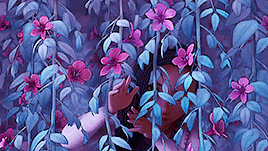
+Asha was a likable enough heroine, even if I found her to be a lot like a two-way fusion of Mulan and Anna placed in a vaguely Snow-White-ish role in her clearly Seven-Dwarf-inspired friend group. Ariana DeBose portrayed her rather well, both acting and singing-wise. I also liked the "social justice" bent to Asha's character where she wants better things not just for herself and her family, but also Rosas overall -- in the French translation of her main song "This Wish," they even push this further by having Asha wish "to see the world happy again someday." We haven't seen a heroine really express this kind of desire for a positive change in the world since Esmeralda in The Hunchback of Notre Dame, and that's cool! Plus representation in mainstream media for previously underrepresented groups is always nice. ^.^
+As much as I don't think they all got enough focus as individuals, I liked Asha's friend group! Especially the fact that it is a friend group made up of people that are around the same age as our protagonist, which -- let's be honest -- isn't that common for Disney heroines. Often with "sidekick groups," you're more likely to have situations like Cinderella with the mice (who are more like cutesy sidekicks than equals) or Snow White with the Dwarfs (who are all quite a bit older than our heroine)...so a friend group made up of peers with their own personalities and motivations was kind of fun.
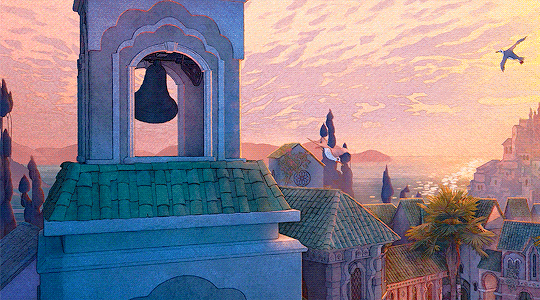
+The setting of Rosas itself could be pretty. I liked a lot of the Mediterranean-inspired architecture, especially inside Magnifico's tower.
+The combination of 3D and 2D-esque animation was also interesting! It really served to give the film its own distinctive visual style that sets it apart from other Disney projects, which I always appreciate.
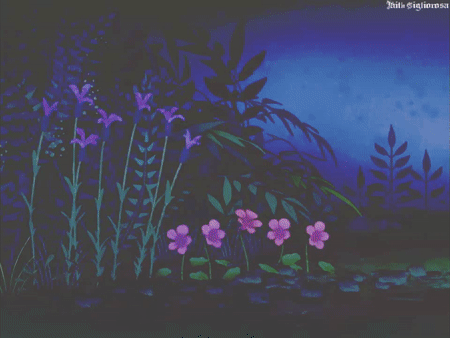
+Star was...cute. Obviously just designed to sell plushies and definitely reminded me way too much of Kirby, but cute enough. I do think it's kind of cool that they're never gendered at all in the entire movie, because it'd be silly to think of a sweet little androgynous ball of stardust as being specifically male or female.
+I liked the idea of Simon "betraying" Asha, only to be turned into a pawn by Magnifico in the process, but not being treated unsympathetically by the story for it. Didn't love the full execution of the idea, but hey, that's what the negative section is for.
+The idea of everyone finding the power inside of themselves to stand up against Magnifico (because they're "all stars," and presumably all have the magic needed to make their wishes come true) was a little predictable, but still sweet. I have problems with how the film wrote it (which we'll get to), but the idea itself was wholesome and fitting.
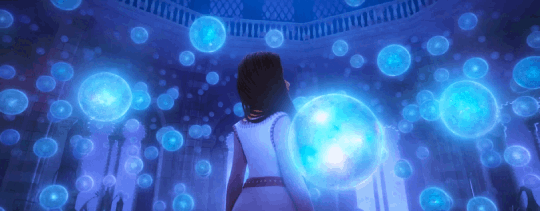
+I like several of the songs, just on their own -- I added This Wish and Knowing What I Know Now on my ITunes as soon as I first heard them prior to the film's release, and now I've added At All Costs too: it's a really pretty duet! (Gorgeous work, Chris and Ariana!) I'll leave my praise here, though, because sadly the soundtrack is going to get a lot of discussion in the less positive section.
The Not-So-Good...
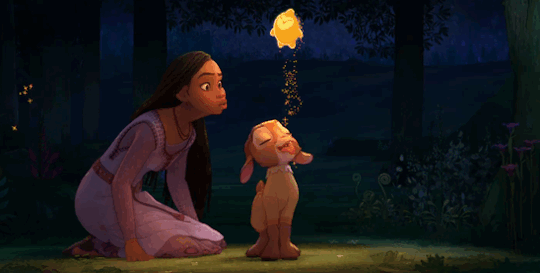
+This film being "Disney's 100th anniversary film" really got in the way of this movie telling a compelling and unique story sometimes. The whole movie really twisted itself into a pretzel trying to check off all the usual Disney tropes, and there were points that certain choices made the story seem incredibly stilted. For instance, one common Disney trope is a dead parent, so of course Asha has lost her father -- but we learn so little about him and he ends up playing such a small role in Asha's arc and story that it seems like an unnecessary detail. Asha's grandfather honestly plays more of a role in Asha's motivation throughout most of the film, so it would've made just as much sense to have Asha's grandfather be the one who believed in stars having power, rather than her father. Another example is the concept of the cute animal sidekick who's just there to make jokes -- as much as Valentino the goat didn't annoy me personally, he added just about nothing of value to the story whatsoever aside from comic relief, in contrast to other funny sidekicks like Sebastian from The Little Mermaid or Olaf from Frozen, who also serve a plot purpose and have a developed relationship with the protagonists. Then there's Asha being cut from the same "naive, awkward, wide-eyed idealist" cloth as many of our Disney Revival heroines like Anna, Rapunzel, and up to a certain point even Mirabel are; Star being in a similar vein to cutesy, innocent sidekicks like Pua, Crikee, and Baymax while Valentino is more akin to sassier, comic ones like Mushu and Sisu; her friends literally being based on the Seven Dwarfs from Snow White; our heroine getting a pretty standard "I Want" song and the villain getting his own solo number that doesn't really take any risks...oh yes, and we mustn't forget the trope of the Storybook opening, which (I'm sorry) I know was supposed to be a reference to Snow White, Cinderella, and Enchanted, but just gave me Shrek vibes the entire time. I was waiting for Shrek to rip out the page and use it for toilet paper any minute. It just felt a lot of the time like the movie was very paint-by-numbers, rather than throwing in much that was surprising or different.
+This isn't even touching all of the pointless meta references to other Disney movies. Asha wearing the Fairy Godmother's cloak and getting a wand like hers at the end -- the mushrooms crowing "we love crazy!" the way Hans did in Love is an Open Door -- Asha riding the reindeer the way Kristoff did in Frozen 2 -- Magnifico using green smoke hands a la Ursula -- the ending with those obvious Wendy and Peter Pan look-alikes, come on, really??? That was just painful.
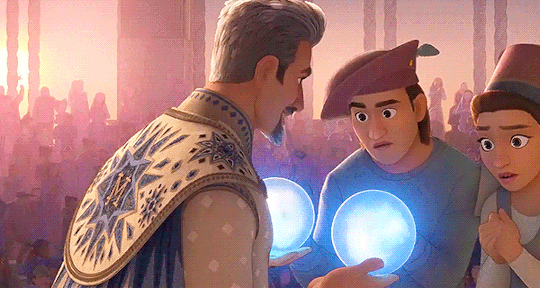
+As much as Magnifico was an awesome idea for a character and Chris Pine's performance was beyond entertaining, the movie did not always write him as well as they could've. From the very start, we see this guy is an egotistical control freak -- obsessed with his own image, incredibly hard-to-please, arrogant, vain, desperate for attention and unwavering praise and adoration from all of his subjects, and determined to keep an iron grip on everyone else's wishes because of the power it gives him. He's ALREADY a terrible person, from the start -- and yet the film tries to introduce this dark magic book that gets no explanation or backstory whatsoever and has no real characterization or presence, so it leaves no real impact on the audience corrupting him and making him a bad person, when it didn't need to! Magnifico was already the villain this film needed! Just let him fall head-first into madness without the book prompting anything! Even if Magnifico "lost everything" in the past, that doesn't make him a good person, if he takes everyone's wishes away from them and hoards them all to himself, only to grant a few now and again when it would make him look good.
+This above point actually leads nicely into one change I really, really wish the film had been ballsy enough to make -- have Asha already be Magnifico's apprentice, not trying to become it at the start of the story. Give our villain and hero a real relationship, with history that started before the events of this film! Asha lost her father at the age of 12...how interesting would it have been -- whether to make Magnifico more of an anti-villain or show how manipulative he really is -- if he'd tried to fill that fatherly role for our main character and twist her to serve his ends? What if At All Costs was rewritten to be about Magnifico not just being determined to hold onto all of the kingdom's wishes, but also this apprentice he sees as an extension of him and his legacy, while Asha is determined to protect this Star she's accidentally summoned and the suppressed wish of hers it represents? This change would've made Asha's break with Magnifico so much more powerful for both of them -- it would've both justified Magnifico's descent into madness and given Asha more reason to feel like it was her responsibility to stop Magnifico. You even could've then played more with Asha's relationship with Queen Amaya too, in this kind of a scenario.
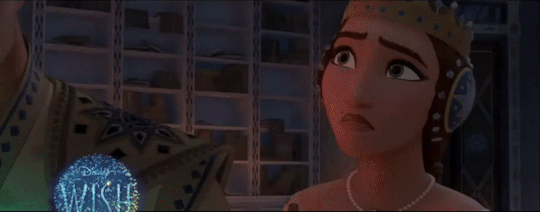
+Oh yeah, and on that note, Queen Amaya. OOH, this really annoyed me -- okay. So this woman is supposed to be a good guy, in this story. But as I touched on earlier, Magnifico was already a pretty awful person, hoarding people's wishes away in order to make himself powerful. Was Amaya truly so blind to that? Did she truly never question anything, ever? But no, really, she only turns on Magnifico after he starts using the dark magic book and actively threatens her. Only that makes her turn from him, and it's pretty damn immediate. Now okay, I hear you saying, it's like Amaya sings in Knowing What I Know Now, right? "The good in him, I've watched it melt // I was blinded by the love I felt"? Excuse me, lady -- but Magnifico wasn't a good person, before. He was just playing a part so as to stay powerful and adored by the masses. And if the story wants to claim otherwise, and act like that dark magic book was responsible for Magnifico going bad, then why would our Queen decide to keep him locked up in his staff's crystal forever? If the book was responsible, then Magnifico would be the Frodo or Golum to the book's One Ring -- he'd be a victim, in such a scenario: one in need of help and pity, not punishment. So either Amaya is a selfish person who only cared about her husband's mistreatment of others when it affected her, or she's a needlessly cruel person who decides to punish her husband for a vice that anyone could fall prey to. Either way, I don't want this woman ruling anyone! Make this woman a straight-up villain, same as her husband, and have the whole monarchy come crashing down after she and Magnifico both go down in flames! VIVE LA RESISTANCE! (Playing into my idea with Asha being Magnifico's apprentice all along, maybe there could even be a twist on the Evil Stepmother trope with Amaya, where she's jealous of how much Magnifico has tried to groom Asha as his apprentice, rather than spending time and/or starting a family with her or something.)
+As I touched on earlier, there wasn't even close to enough time to develop all of these characters properly. Since our heroine and friends are most similar to Snow White and her friends the Seven Dwarfs, let's compare cast size. Snow White is 83 minutes long and has a cast of ten (Snow, the Prince, the Queen, and the Dwarfs) -- Wish is 95 minutes long and has a cast of fourteen (Asha, Magnifico, Star, Valentino, Amaya, Asha's mum and grandpa, and our seven Friends). This results in us getting the vague idea that "Grumpy" role Gabo is sweet on our "Bashful" role Bazeema, but no time to develop their relationship or give it any kind of conclusion; the others saying "Sneezy" role Safi apparently loves the castle chickens with no sympathetic explanation why, to the point that he gets super excited about a chicken growing to a giant size for no real reason; "Doc" role Dahlia having a crush on Magnifico that is then dropped immediately after Asha turns against him; oldest kid and "Sleepy" role Simon feeling incomplete without the dream he gave Magnifico and "betraying" Asha as a result in an attempt to get it back, only to get stabbed in the back by Magnifico, and then have no time for a proper redemption after he's unhypnotized; Asha's grandfather turning on a dime about whether or not he wants to know what his wish was if Magnifico thought it was dangerous; Magnifico getting some justification in his backstory for his bad behavior, but Amaya's backstory being a complete black hole before she married Magnifico when you'd think it'd explain all the more why she stuck with him so long; and Asha's mum having her wish crushed to dust by Magnifico and then given back without us EVER LEARNING WHAT IT EVEN WAS IN THE FIRST PLACE, even after we see just about everyone else's wishes as soon as somebody picks it up and Asha's mum's wish gets picked up multiple times!! Come on, if you're going to set up NOT showing it, you may as well have a pay-off for it!! At least give us some moment where Asha's mum hugs her in relief and acknowledges that her daughter was her wish! That would've been a nice "aww" moment for everyone!
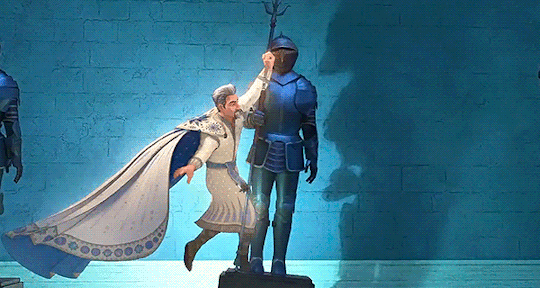
+Okay, I said I was going to talk about my problem with the songs, so here goes. As I said before, I listened to the soundtrack before watching the movie, and even when I did, I could immediately sense a problem: these songs did not tell me much of anything about the movie, just on their own. Welcome to Rosas, which is pretty much just an exposition dump about the kingdom and how Magnifico founded it, didn't really paint a picture of our setting or characters much at all, the way opening songs like Belle or The Family Madrigal do. This Wish, although pretty, was something I could hear just as easily on the radio -- it didn't feel as tied or necessary to understanding our heroine the way something like Part of That World does. I'm a Star, quite frankly, felt like a lot of inspirational word salad, rather than anything particularly memorable or revelatory -- why else wouldn't it even be worthy of a musical salute in the reprise, where Asha remembers that she and everyone else are stars during the climax? Even after reading summaries of the plot and spoilers from the storybook for this film, I could not figure out for the life of me how At All Costs would fit organically into such a story, being sung by our villain and hero. It wasn't until I saw the film that I saw how the filmmakers decided to fit it in and honestly...the song didn't help tell that particular scene at all. It's a really pretty song and I like it a lot -- but it lacked any of the irony or contrast that kind of a scene that introduces the difference in focus between our hero and villain required. If the scene itself is needed to understand what's supposed to be going on while the song is playing, then the song is not effectively telling the story and is therefore unnecessary. There wasn't even a particularly Spanish or Mediterranean flair to the soundtrack to help set the stage, aside from the occasional flourish of castanets -- instead it sounded very contemporary, which I guess is appropriate, since it was largely written by pop composers rather than any musical theater talent.
+There were also points where the songs felt the urge to shove in a bunch of extra words just because, rather than have the words flow well and really mean something. I'm a Star is most guilty of this, of course, but even in This is the Thanks I Get?, we hear Magnifico gripe that "I let you live here for free and I don't even charge you rent" -- mate, THAT MEANS THE SAME THING! If you live somewhere for free, then you are NOT paying rent!
+Knowing What I Know Now is a bop and I like it (aside from Amaya's stupidity), but I'm sorry, all I can think when I hear it is "This is clearly trying to be Ready as I'll Ever Be from Tangled the Animated Series, but that song blows this out of the water." However fun the song can be, it would've been so much stronger if it actually addressed the contrast between the characters and revved us up for a big final battle, instead of it just being our eight underdeveloped characters psyching each other up.
+The idea of everyone being stars was a lovely idea, but the execution of Asha remembering this fact and using it to defeat Magnifico was terribly handled. First off, there was no revelatory phrase or action that prompted Asha to remember this fact, so her suddenly saying that "they're all stars" came out of nowhere. Second, even putting aside that there'd be no way any of her friends could hear Asha from all the way up on the tower if they're stuck in the courtyard below, there's no reason I can see for Asha's friends or family to know what the hell she was even TALKING about. They weren't there when the I'm a Star number happened! And the way that number made it seem, just based on the visuals, it looked like the "star" power came from a person's dream, since it's the same glow that returns to Asha's grandfather when he gets his dream back, but most of the town's dreams have been already yanked out by Magnifico at this point! I think the idea is that since everyone is a star, even with that big piece of them and the power accompanying it taken out, they still have enough stardust inside of them to be powerful enough to chase their heart's desires...but yeah, I'm sorry, for all the word salad I'm a Star threw around, this world-building aspect was really not made clear, and because of that and the lack of a proper callback to this plot turn, the climax didn't hit as strong as it should've.
Overall, this film felt a lot like a batch of unbaked chocolate chip cookies that someone decided to throw a bunch of brightly colored sprinkles on top of, just because they could. A lot of ideas just don't feel like they were fully developed, and there was a lot tossed in that didn't contribute to the overall taste or bring the disparate elements together in a cohesive whole, instead feeling more like a distraction than anything of actual substance. That doesn't mean I couldn't eat it -- I like eating cookie dough as much as the next person -- but that doesn't mean it felt like a complete, finished product worthy of great praise. Instead I'm left looking at the wasted potential and wishing the movie had carved out its own path more, one distinctive to itself, rather than just be a mashup of previous Disney concepts and tropes. I won't act like there's nothing to like here, nor that it's completely lacking in heart: I actually would love to see fandom for this movie re-imagine it in ways that could've improved the story and characters, because there were SO many good ideas here...but for me personally, this movie left me colder than it should've and -- like Asha after meeting Magnifico -- a bit disappointed.
So I make this wish...to have Disney make a film better than this.
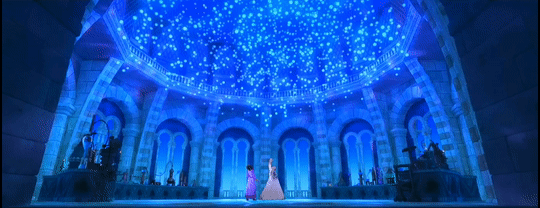
Overall Grade: C-
75 notes
·
View notes
Text
Is Guren a narcissist?
Lately I dislike Kagami's portrayal of Guren as much as the next person and tbh there's absolutely no way you can make me think he's an innocent victim or a tragic hero we should root for (though I still do root for him cause he's just pathetic and gay I love him). However, the amount of times i've seen both the hispanic and english fandom call him a narcissist is kinda surprising 👀 Now the question is...
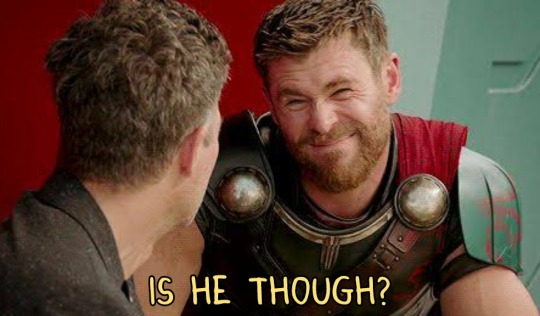
So since I'm petty and I like analysing useless stuff, let's take a look at Guren's behavior and at what makes a narcissist to try to give a more elaborate answer. I'll give as a disclaimer that I don't intend to attack anyone or force anyone to like Guren with this post, I'm just a psychology student currently investigating personality disorders and I thought this take would be fun to share.
Also, english is not my main language so do feel free to point out if you see I make any mistake so I can correct it, please ;u;
So for starts, if we're talking about the reasons for why people use to call him a narcissist I believe that pointing out his behavior towards Yuu is a very fair argument, especially his behavior towards Yuu at the beginning of the manga. Guren expresses himself with superiority, these airs and graces and apparent laziness and lack of thoughtfulness. However I believe that if you know how the story in the light novels go and even more if you've read them, you'll realize that all this "I'm your saviour, your god, you owe me your life, blah, blah, blah" crap that Guren tells to Yuu is a way of imposing authority and exerting some kind of control over him.
Guren needed to exert this control and authority as a way to protect himself, his subordinates and his investigations from the JIDA higher-ups, but also to keep Yuu at bay, not only because he was a part of Guren's experiments but also because Yuu used to be a very asocial and volatile kid when Guren took him under his wing. Having an angry kid acting impulsively at his leisure all around the JIDA was not convenient for Guren or for anyone, honestly.

And yes, I'm not gonna deny that Guren is kind of a jerk, but that has more to do with his personality and his sense of humor than with being a narcissist. He's sarcastic, super hard-headed, quite blunt and may come off as conceited, but he's actually extremely aware of all of his mistakes and shortcomings. He recognizes that he is not the smartest or the strongest out there, he knows how powerless he is in the grand scheme of things and most importantly, he recognizes his mistakes and is absolutely willing to take his share of the blame for it.

Sure, he knows that he is a strong individual but that's because he's worked towards the objective of "being strong" his entire life, he's cultivated perseverance and done sacrifices in order to achieve that strength, and while he does like to show off sometimes, recognizing one's merits and being aware of your capacities is hardly the same as having delusions of grandeur. Plus, his motivations are very much oriented to help others, protect others; and although Guren used to have a very strong sense of self-preservation, after the catastrophe he decides to let go of it if it means that it will help him to achieve those goals of keeping his loved ones safe. He starts doing what he 'has' to do rather than whe he wants to do.

After Nagoya's Arc, the shameless and overbearing side of Guren's behavior gets toned down. He becomes more serious, he doesn't play and makes jokes as often and he also stops trying to impose himself to Yuu in the same way as before. There's no need of that superiority facade anymore after all the things that came to light and now that the JIDA poses less of a threat and that Yuu has become less of a subordinate and more of a collaborator, exerting the same authority as before is just not necessary.
And now that we're referring to Yuu, we also gotta point out that a narcissist lacks empathy and doesn't go out of his way to try to help or benefit other people, but Guren does feel affection towards Yuu. When Yuu came to him as a child full of rage, resentment, guilt and lust for revenge, Guren genuinely empathized with him, he took care of Yuu, tried to teach him what he knew and he pushed him to build a support network with his classmates when he didn't really had to do all that. He could've simply taken advantage of Yuu's grief and solitude to control everything about him and force him to collaborate, but he didn't. Even when doing that would've been the best and most practical option for Guren's purposes, he still decided against isolating Yuu. Plus a narcissist wouldn't be capable of the affection and compassion that Guren feels for Yuu. And it is also made clear that Guren does not enjoy using Yuu or hurting him, but Shinya and his squad are Guren's priority, putting his options in a balance, he knows that he has no choice but to keep using Yuu to make his plan work. And it IS selfish and cruel and abusive, we're not going to deny that, but arguing that he doesn't care about Yuu or anyone else but himself is a pretty reductionist (and tbh also incorrect) statement.
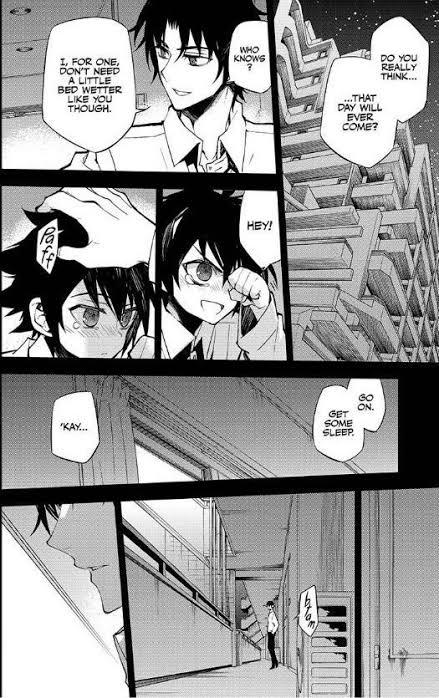
Now, let's take a look at Shinya's opinion about Guren, taking into account that Shinya is probably the person who knows Guren the best out of all of the Catastrophe at 16 cast and probably all of OnS.
First of all we have this scene during the Nagoya Arc in which Shinya shows concern about Guren cause he knows that Guren suffers when people die and that he's not good at handling that.

Guren cares about his subordinates, he is saddened by the death of his soldiers and during this arc, he even makes the rather emotional choice of going straight into a trap in order to save other soldiers that Crowley is holding as hostages, even when Mito and Shinya warn him that they shouldn't do it cause it is clearly a trap.
I know there's a lot of material that I'm not covering, but for the sake of not making this post longer than it already is, let's go ahead and just check some of the behavioural criteria that a person has to meet to be diagnosed/classified as a Narcissist; of course, taking into consideration that meeting one or two criteria isn't enough cause it is very likely that everyone will present some of these criteria some times throughout our lives. For a person to be considered a narcissist they must meet various criteria which manifest constantly in various different contexts of their life for most of the time. Some of the criteria include:
•A grandiose sense of self-importance, being it fantasies or behaviors and the expectation to be recognized as superior without real reasons.
In Guren's case, he's not really the type that brags about his deeds or that goes about life expecting people to praise him, specially when there's no reason. The only times one could say that he sort of acts this way is in his interactions with Yuu in the early chapters.
•A narcissist is very often preoccupied with fantasies of unlimited success, power, brilliance, beauty, or ideal love.
Although Guren, does desire power and recognition, he is aware of all he's lacking and beats himself up because of all these things that he knows he isn't good enough to achieve. We can also notice that ultimately, his desire for power originates from his desire to keep his loved ones safe.
•A narcissist believes that they are “special” and unique and they only want to associate with, other special or high-status people (or institutions).
In Guren's case, he knows that he kinda sucks. A lot of the people around him belong to a higher status, have a higher military position or are better than him in one way or the other. What Guren does is working towards his betterment. He doesn't believe he's special, in the novels, he even seems to be a bit ashamed about the subordinates in the Ichinose manor thinking that he is a prodigy. We also have that although it is obvious that Guren regards his squad as the most important people to him, and is willing to commit atrocities and become very self-sacrificial for them it is not because 'they are the best' or because they have a high status that Guren's ego can feed on, but just because he loves them.
•A narcissist has an excessive need for admiration
Guren is indeed an admired character, however he doesn't "need" to be admired. Even before the apocalypse, the motive behind his goal was not to be admired but bring respect and dignity to his beaten up clan. He's had plenty of chances to show off, but he just doesn't really needs to be admired for that.
•A narcissist exploits their interpersonal relationships for their own benefit.
This point is a bit tricky cause Guren is undeniably using Yuu and he had the same intentions with Kimizuki and Yoichi to achieve his goals. However, besides from knowing that Guren would not be doing this if there was another way, when we take a look at the rest of his interpersonal relationships, specially with his squad, being exploitative of their relationship for his own benefit is just not there.
Some other criteria include an excessive sense of entitlement, a lack of empathy, constant envy and the belief that others are envious of them, and haughty behaviors, all of which we already tackled before.
So, taking everything in consideration, we come to the conclusion that although Guren has displayed some narcissistic attitudes, overall he does not fit the profile, therefore, Guren is not a narcissist.
This of course doesn't mean that we have to condone all the bad things he's done, but rather may help us gain a bit more insight into Guren's character. Exploring his relationship's dynamics, and other mental health conditions which's profiles he may fit would be fun as well. He is indeed a very flawed character, and maybe that's what makes him interesting.
And that's it, if you read the whole thing, thank you for sticking till the end :) If you enjoyed this do let me know and in the future maybe we can tackle some other ons characters and their issues from a clinical perspective, I would also love to know your opinion on this if you have one or for you to point out any contradictions, mistakes or important things I may have missed to make this post better. Thanks for reading ♡. ❛ ᴗ ❛.)
#owari no seraph#seraph of the end#guren ichinose#ons#gureshin#shinya hiiragi#catastrophe at 16#yuichiro hyakuya#narcisstic personality disorder#character analysis#ichinose guren#catastrophe at sixteen#sote#guren's squad
157 notes
·
View notes
Text
❤️🩹Chiron In Signs Part 2❤️🩹
💖Chiron in Libra early experiences of being treated unfairly might have led you to develop a role as an advocate for those who have suffered injustice. You may have experienced many injustices and accusations as a child that you were not guilty of. They are prone to experiencing abusive or toxic relationships often because they are a passive and vulnerable target. These types are far too afraid of being alone and either behavior manifests because of this fear. Chiron makes people vulnerable when they are not around people they trust, love, and care about. The world is dark and meaningless without your partner, friends, and family close to you. Many times in the past, you may have felt alone and lost. 💌You can heal others by helping them nurture and love themselves.
🦋Chiron in Scorpio disempowerment might be a theme from childhood years. You can find creative ways to work with deep feelings. You may have struggled many times with the secrets of family or others. With dark things and hidden. Many times you may have experienced powerless and betrayal. A lot of people could hurt you, take advantage of you. Many times you have felt weak in family situations or with people around you. You may have been afraid to talk about family-related things or deeper things. They will have gone through some form of psychological trauma or abuse that causes them to become overly protective of themselves, their belongings, and their loved ones. It also means experiencing a lot of emptiness and deep-rooted feelings that will always remain in your memory. Your wounds can be deep, deeper than others so there can be a lot of anger in you, the pain you feel from the past. Your goals are to forgive and overcome. And learn to turn your pain into strength and beauty. You are on a journey to understand the meaning of life,transformation, and death. You can become an inspiring teacher to others. 💌You can help others by sharing your depth and pain with others and showing how to overcome it.
🫀Chiron in Sagittarius you might have sacrificed opportunities for further education or travel, Or loss of faith may have led to restless searching for your own beliefs. You often have the feeling that you can't find your faith or that this is a problem for you. It can be very difficult to believe or find faith in yourself. Even your path can be very confusing at times. You don't know which way to go or where to go. You may feel that nothing in your life matters. As a child, you may have been left to fend for yourself. Also you may express different opinions, beliefs, or personal values than that your family or community, such as having a different religion, sexual orientation, or means of thinking/self expression. 💌You can heal others by teaching them the value of thinking for themselves.
🧚🏽♂️Chiron in Capricorn you may have shouldered responsibility at an early age. A feeling of not fitting into the system can lead you to carve your own image of authority. The wound is related to the individual’s need for stability and control, as well as their sense of trust and status/reputation. You can feel as though that u are unappreciated and unrecognized for the things you do. You genuinely believe that u are doomed to a life of chaos and unpredictability, influencing you to feel the need to take control of every situation.💌 You will have the ability to heal others through offering guidance and discipline in areas they need these traits.
🍁Chiron in Aquarius acommitment to social equality and acceptance of diversity might emerge from an early situation where you did not fit in. As a child you felt like you belonged nowhere and no one accepted you into society. You can also have a hard time finding friends. You will feel all alone even if you have friends. Maybe you can feel that no one understands you and you feel alienated from people. You can always feel different from others. They may not be able to fully connect with others out of fear they will be seen as weird. 💌You will heal others by supporting and encouraging them to be different and to be brave.
🫧Chiron in Pisces this may suggest an early experience of loss, illness, or sacrifice. You can develop your own holistic spiritual vision and assist others to do the same. The individual will naturally feel victimized and betrayed from the moment they gain a realization that they are alive. They see the world as cruel and unfair with all of its poverty, hate, and violence. You can experience many deceptions as a child, you can be a victim of others and your subconscious. Chiron in Pisces rarely ever get realistic and look for the cause of the problem elsewhere. You would never blame yourself, even if it is something that can be completely your fault. Because you carry a Chiron wound that makes you feel like life hasn’t been fair to you like to the people around you, you can’t emotionally connect. The Chiron wound can also come from early childhood when your parents or other family members made you feel like you weren’t important or didn’t notice your accomplishments. 💌You will be able to heal others through teaching them the true meaning of life.
🍭Comment if u want chiron in houses🍭
-Rebekah🦋🫧🧚🏽♂️
#astrology#energy#zodiac signs#planets#my notes#chiron#healing#scoprio#libra#sagittarius#capricorn#pisces#aquarius#part 2
709 notes
·
View notes
Text
True love is possible
Only in the next world - for new people
It is too late for us
If there was any summary of the sentiments that encapsulate my thoughts and response to Echo, it is this line from Disco Elysium. Though decidedly on the psycho-paranormal spectrum of narrative than political, the same sentiment is expressed. A complex combination of psychological and paranormal factors, external and internal forces, contribute to an intense and gut-wrenching backdrop for a horror-themed visual novel. Because of this, Echo’s focus and sentiments trend extremely closely to Night in the Woods. Like Disco Elysium’s more American counterpart, the culture and sentiments expressed in Echo are decidedly exclusive to the geographical area of its setting. Its approach is undeniably rooted in American individualism and the American psyche, tailored further to portray the particular quirks of the post-frontier United States.
Normally I’m not really one for horror, having not enough of a visceral imagination for Steven King but also lacking the stomach for the same genre in motion picture. Echo, for its part, trends more towards the former than the latter, and the genre serves as an excellent backdrop to explore themes of generational trauma, the border between perception and reality, and the external and internal circumstances that become the driving force behind the formation of identity and interpersonal relationships.
Like Adastra, Echo acknowledges a baseline awareness of socioeconomic conditions, but it’s primary focus lies elsewhere. Adastra has often been described by others as an inversed dating sim, while Echo is often described as an anti-dating sim. The analysis carries merit on a number of points for consideration.
If horror and fear is the recognition of one's helplessness in the face of a dire threat, it is only natural that the game presents a perpetual and necessary sense of powerlessness to the cast of characters; whether driven by their own will or by circumstances they are helpless to alter, they are all subject to forces that can neither be fully articulated nor influenced. None of them fully understand themselves or their peers; the bonds that unite the cast of friends and define them all are contextualized by trauma, even victimhood. Their efforts and desire to escape their victimhood defines them as much as the victimization itself. There are “better” endings and some “worse” endings, but I don’t think any of them could truly be said to be “happy.” No matter whom you choose, no matter what route is pursued, there is no “ideal” or “perfect” ending for Echo. The sense of futility instilled within the player is given as a disclaimer from the very beginning.
You’re only going in circles.
Historical trends within Echo are cyclical; likewise, the paths available to the player do not necessarily distinguish between “good” and “bad” endings, but merely serve to paint a clearer picture of what happens. The other routes do little other than to add splashes of color to what is largely an already foregone conclusion. Pursuing all of the routes is better performed as an act of morbid curiosity than any sort of hope that things will turn out fine.
Of course, the pull and the quality of Echo as a visual novel is getting the player to, in fact, care for the characters trapped in a largely bleak situation. Unlike Adastra, I had incentive to approach the game at arm’s length, but even with my reservations in mind, I ended up hooked onto just about every character and route presented in the game. Perhaps it is just my parasocial and sentimentally-prone heart being at odds with my better judgement, but that is part of the draw, the appeal of this visual novel; it pits the heart against the mind, hope against hope.
From here on, since I will be getting into specifics and potential spoilers, I’m putting the rest of my review under a readmore.
The limited impact of player choice recurs frequently in Echo in a myriad of ways; Chase as a protagonist lacks agency not only as a result of his own socioeconomic conditions and past trauma, but also by the very nature that his actions are partly determined by the player’s choices as well as the remnant influence of Samuel Ayers. Sometimes this manifests as internal monologue inconsistent within Chase’s own mind, and in more extreme examples, locking players into a single choice and even a perspective shift to the second-person. In such instances, the narrative is railroaded into advancing the plot. In other circumstances, the player is hampered by the dispositions and actions of the characters themselves. Few (if any) opportunities exist for the characters to change who they are; many have already grown into themselves with varying degrees of personal baggage and history that largely determine their behavior and reaction to certain events. Chase as protagonist and player character, by contrast, has extremely little personal autonomy and personality, despite having a name and a backstory that cannot be changed, only discovered.
The only notable exception to this rule is in Flynn’s route, where the player experiences a perspective shift from Chase to Flynn, accompanied by a restoration of Chase’s personality and individual identity at the direct erosion of Flynn’s. It’s a subtle implication that the nature of the player’s choices and interactions alter the identities of the characters by whose perspective they take. There is a give-and-take dynamic at work; we get to see the inner workings of the friend group from the protagonist’s perspective even as their perspective is altered by the player’s presence. This is most pronounced when Sam’s thoughts intrude on that of his host character. In general, the player’s experience in Echo serves to highlight the disconnect between influencing an individual directly and the ability to influence the people around them, not in the least because there are other external forces competing for control as well.
Further complicating this dynamic are the presence of the paranormal entities that amplify and otherwise alter the already unstable disposition of the people of the town, some borne of intense desire, others out of an almost consequential animus from past misdeeds committed in Echo. A scientific explanation for these occurrences is sometimes posited but never directly linked; what is clear is that the cyclical appearance of these entities is triggered by a slow accumulation of injustice and suffering that spill over in key moments that trigger the mass hysteria in the town. The experiences are simultaneous and shared to some degree, but are often perceived differently, colored by the accumulation of (often traumatic) experiences of those witnessing the events unfold. Some of these entities are manifestations made to witness tragedy, others entities seem intent to directly incite them. There is no clear dynamic between the forces that seem to overlap and intersect with each other at various points in the story; only that their appearance is the mark of a general decline of sanity for the town. Prevention other than complete avoidance is impossible; efforts to mitigate its effects are limited.
Though the exact causes of Echo’s decline are not made entirely clear, the pattern of mass hysteria throughout its troubled history, coupled with a broader socioeconomic decline over the decades, reinforces a general impression of inevitable failure. By the time of the events depicted in the visual novel, it is all-but guaranteed to become nothing more than a troubled memory. Its persistence is largely the result of habit, the last gasps of people living in spite of their circumstances, and a seemingly overall desire to salvage what good is left. The existential crisis is palpable; a sentiment that is also shared with Night in the Woods.
But here Echo takes the paranormal and the psychological breaks a little bit further. What happens, exactly, when we hold on to anything at the end of everything? Each of the routes are an answer to this question, none of which are designed to be all-encompassing or comprehensive; the act of choosing a route is simply a different examination of how the cookie crumbles.
Of all the routes in the game, Carl’s shows a good deal of character growth, detailing the ram’s journey of paralysis and coping in the face of his fears and expectations placed upon him to a broader acceptance for responsibility in the choices available to him in life. This is, in part, dependent on the player’s choice for him to face his fears directly or to rely on external forces to bolster his shortcomings. The horror setting serves as a backdrop to force a resolution to Carl’s issues, when so much is at stake. Should Chase encourage him to be his own person and not rely on the ghost of his dead ancestor, he will be set on the path of self-actualization. It is not a momentous or glamorous occasion; it is grounded and modest, an honest reckoning of himself and his circumstances that dispels the hold that the socioeconomic legacy of his family has upon him. He frees himself and Chase is there to witness it; but as a result of all this effort spent with a single individual, the rest of the cast of friends all turn out worse by the end of the hysteria, to varying degrees. In terms of material conditions, Carl is given more than any of the others the means to break from the legacy of his past despite the ways he is also hampered by it. The rest are not so lucky.
A prominent but mostly background force in Echo is that of family; many that try their best to accept and love one another and many more that are broken, dysfunctional, and outright abusive, and all of them a product of their cultures and socioeconomic conditions. Though distant and fairly permissive, Carl’s well-off family offers him a secure foundation towards financial independence and success, and to this end has also railroaded him with expectations that he one day assumes the mantle of the family business. Leo’s own family sticks closely together as a tight-knit group of immigrants from a distant country, one that shares much of their lives with each other and expects, at least to some degree, reciprocal goodwill. Leo himself buys fully into this mentality, even as he easily grasps the idea of family beyond blood relations. It also comes with traditional expressions of heteronormativity and patriarchal attitudes. The same heteronormative expectations are reflected in Chase’s otherwise loving and accepting family, and expressed in much more toxic ways in Flynn and Sydney’s parents. At first glance this toxic heteronormativity can be attributed to the religiosity of the two characters’ families, but this dynamic is not evident in TJ’s own deeply religious background. TJ himself could be considered a more ideal product of someone who had more or less fulfilled the expectations of his parents, to both the benefit and detriment of his person. Socioeconomic considerations for the characters’ families play a greater role in affecting the growth and the outlook of the friend group, as evidenced by Jenna’s impoverished household. Their coping mechanisms in the face of poverty often turned self-destructive and abusive without the presence of religion in their lives. Jenna in turn sought to escape her conditions but also to understand them; she hints at her political views more often than most others, and her interest in psychology is rooted in not only understanding her own situation but also how similar life events have affected all of the people around her. Broadly, those within loving families adopted their parents' values to some extent, while the others found it easier to make (and value) their own choices in life. In some respects, the latter grew up faster, though it is also notable to point out that TJ, not only being the youngest, is also treated as the baby of the group.
TJ’s route is less about his own personal growth and more about how Chase’s desire to nurture and protect him leads to an extreme psychotic breakdown, culminating in a (repeat) murder and the reinforcement of the cyclical violence that plagues Echo. TJ’s fragility and non-aggression makes him something of a victim that Chase feels compelled to protect; it is not the first time that he has acted in response to this compulsion. Here we see the road to hell, paved with good intentions; Chase in his efforts to protect the remnants of good from otherwise awful parts of Echo perpetuates the same cycles of violence that ultimately lead to the town’s final demise. This compulsion is not unique to Chase; the entire group dynamic involving TJ reflects this at-times unhealthy protectiveness of his apparent naivety, albeit to lesser extents. TJ remains a victim partly because of the tendency of his friend-group to treat him as such in an effort to protect him from harm.
One of the most dominant (and relatable) themes within Echo is pain aversion, not only oneself but for the community that one identifies with. These manifest in all sorts of coping mechanisms and scars that manifest in both beneficial and harmful consequences down the road. Drug use features prominently, as does therapy and prescribed medication, but none of this addresses the root cause of the chronic illness plaguing Echo. The wounds that fester run much deeper, beneath an already thin veneer of civilization until the caustic buildup spills out into a mass-hysteria event. All at once, everyone’s personal problems and historical baggage become everyone’s problem, and the cycle begins again. While there may be healing of the initial wound, there is no restoration in the aftermath, only scar tissue and new points of sensitivity, fertile ground for the cycle to begin afresh.
Of all the routes, Flynn’s is the clearest glimpse players get into the paranormal workings of this cycle. Indeed, his inability to process his grief with the others as a result of unresolved questions over Sydney’s death is what drives him away from the group, and join into a gruesome and timeless entity positioned to glimpse at all the moments of great suffering and tragedy that kicks off the cresting wave of hysteria. His desire for answers ultimately outpaces his capacity for relationships with his friends, and even his own desire for closure. The price for the knowledge he desperately seeks is his own identity, his very personhood. He merges with the cycle and becomes witness to it. Of all the characters in Echo’s cast of friends, Flynn was understood least, in no small part for his frustration and relative inability to express himself with any degree of sincerity outside of biting, dry humor and his stilted desire for intimacy following the death of his closest friend Sydney. His transformation marks the end of the road where his trauma drives him, where he becomes a stranger even to himself, losing all sense of self.
This end strongly contrasts with Jenna’s route, which arguably contains the strongest example of player agency affecting the outcome. It has one the most positive of the endings available and arguably one of the worst; a decision that is largely contingent in the face of an existential, yet everyday question. How much control can we exert over our own will? Over others who seem to have no power to control themselves or the circumstances they were subject to? When agreeing with her initially negative mindset, she is intent on wiping the wounds of the past (the whole slate really) clean through violence, first by the murder of Heather and then by the flooding of the town of Echo. But when Chase encourages her to see the good in the company of friends that gave her the solidarity to endure, Jenna can forgive and let go of her past rather than destroying it. Most of the others are given the opportunity to do the same, and in the end they all survive. The group retains its cohesion despite their flaws and is given a clear road to move on; Echo is left behind forever. The cycle continues, but they are no longer party to it.
And then, of course, there’s Leo.
I saved his route for last because I found it odd that the anchor bracelet on his arm is the same as the icon used for cursor mouse in-game. Being Chase’s ex-boyfriend and the catalyst behind the whole group get-together in the story, it was clear his role in the story was meant to be a central one; even so, knowing how messy things would be, I avoided going for his route until I had exhausted all the others. In a stroke of irony, I believe this is what ended up making me fixate on him the most, and (despite my best efforts) wanting to see him happy; not just happy in the sense that he would no longer captivated by Echo, but happy because his old happiness could be restored to him. But this is a horror VN, and Leo of all the characters can never truly get a happy ending. For both narrative and character reasons, I knew he would not find what he was looking for. What he seeks had died and was buried three years ago; to try and bring it back would be a necromancy of the worst order. And so, in the act of giving the wolf kept taking, until what he had become was a stranger and a monster, unable to understand that he had sacrificed everything: himself, his friends, his former lover and best friend, for a temporary and psychotic happiness. I had understood this from the beginning, and yet I could not help but desire for a path forward for Chase and Leo to be together once again.
Part of Echo’s peerless quality is its ability to showcase the past in the rose-tinted lens and the lens of trauma in equal measure. It is not simplified of its complexity, nor reduced to a lesson in building character. The people in Echo do their best to deal with the past, clinging to the good and rejecting the bad each in their own way, and often to their own detriment. All the same, the past exists independent of the desires and aims set upon it, and its echos reverberate to the present day from the days of old, far beyond any single lifetime. The weight of thousands of years of history exercises itself upon the world, heedless of the will of the living to alter it.
Both in spite of this animus and because of it, there is a persistence to Echo; it is not a town that passes into memory from apathy and despair, but from illness, neglect, and the chronic failure that has been present from the beginning. Echo’s paranormal conditions merely accelerate the pattern of history that had followed the people who had founded the town, and all who had come and gone since. It magnifies the essence of, for a lack of a better term, the human condition. Even as Echo itself expires in the face of its own entropy, the lives that once called it home live on, forever marked by the scars it leaves behind. It does not kill them, and yet it will not fully disappear. Humanity in its near entirety permeates every single aspect of Echo as a visual novel. It is existential persistence in its rawest form.
This existential persistence is the same found in Night in the Woods, the same as in Disco Elysium. It is far removed from any sort of idealism, or any sort of ending that resolves all the underlying issues plaguing the characters from the beginning until the moment the player enters their lives. In this respect, Echo and its sentiments deconstruct the traditional purposes and structures of its genre. None of the characters who seek romance here will find it. For those within the cast that do, it remains a possibility for the future, but that future is beyond the world of Echo, and beyond its people as they currently find themselves. As far as love relates to Echo itself, there is only a shadow and a passing remnant that ought never make its return.
29 notes
·
View notes
Note
I have a question why is Karen Kasumis tarot justice?
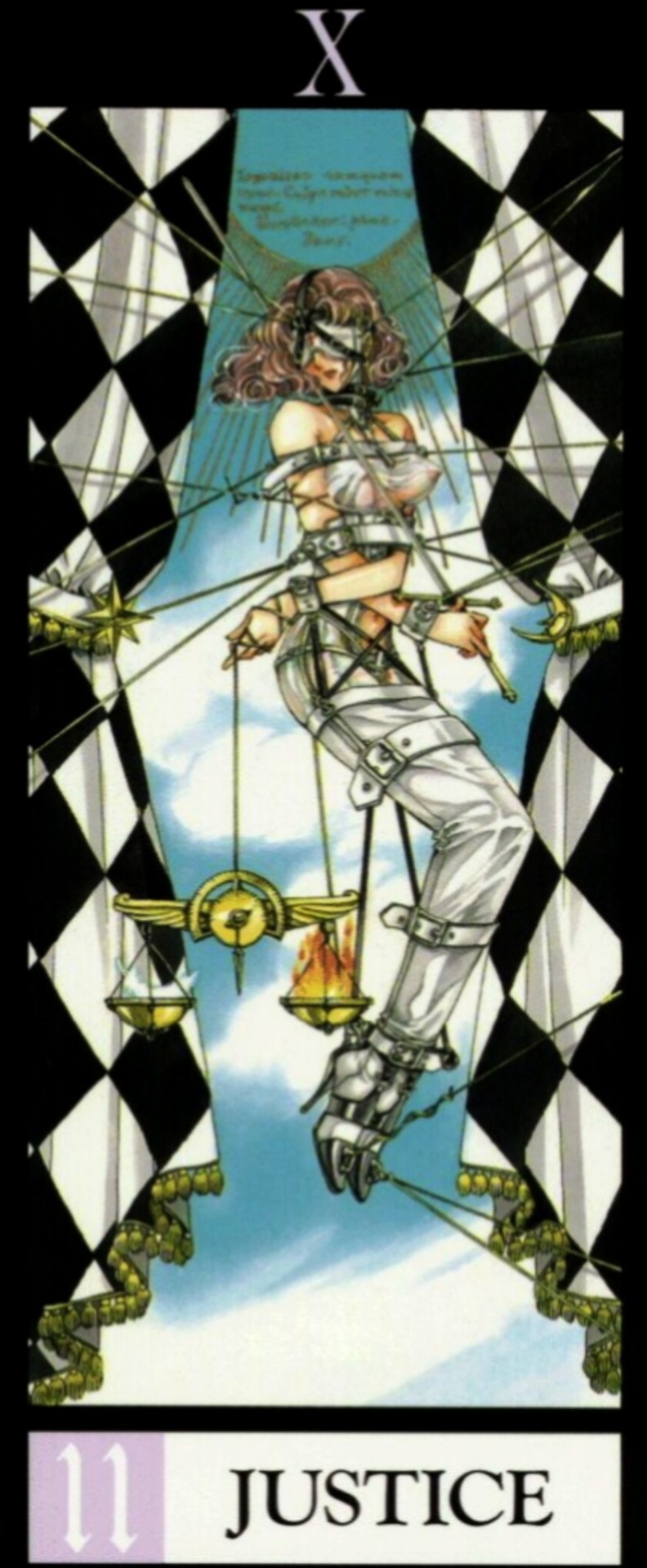
I think it's because of couple of things (like being logical, trying to be fair etc.) but mostly due to disbalance of how she views others vs how she views herself. Keep in mind X is very dark series. Most of characters fit descriptions of their reversed arcanas as well (like Kakyou or Seishirou for example).
Blindfold in Justice card is often meant to symbolized unbias but combined with chains and restrains here I think it's also meant to symbolized powerlessness to move from one's maladjusted seemingly logical but actually flawed views. On weights we see flame (symbol of why she was shunned and demonized her whole life) and feather (could symbolize freedom but I think in X context it's more about fate of the world matters; which once more can be tied back to matter of freedom, fate vs coincidence). Same powers which give her ability to protect those she cares about also hurt her and chained down to maladjusted mindset. If it weren't for the fate she wouldn't have those powers and wouldn't be dehumanized. If it weren't for powers she wouldn't have found herself in situation she is in X. So where coincidence begins and fate ends? What's the cause and what the effect? Anyhow connection exists, and justice is all about colerations and balance.

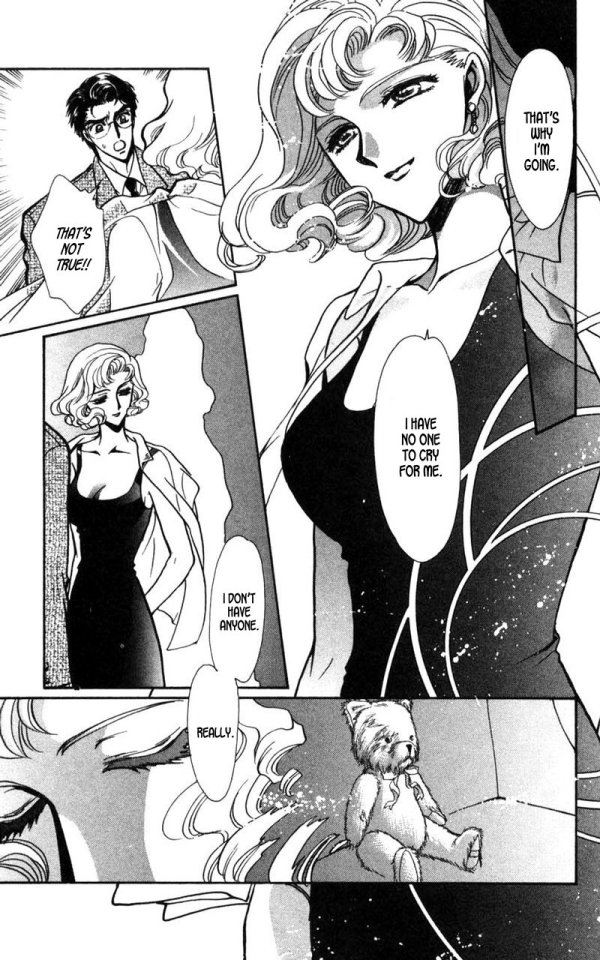
One of Karen's major traits is that she doesn't want to burden others. Here she'd rather put herself in jeopardy than let other Seals be in harm's way. Why? Because according to her words 'noone would weep for her'. That's why she drugged Aoki in this scene so he doesn't go to defend a Kekai and dies (and leaves his wife and kid alone). What she failed to realize that if she dies, someone would be sad. Aoki told her so much later on. I'll return to this ideology later on.
In similar fashion she's concealing her emotions from Aoki because she doesn't want to burden him. Kind of her, but once more she's purposely suffering on her own just for sake of someone else. Karen is kind, compassionate, empathetic, understanding but only towards others. She never treats herself with that compassion. That's probably result of her messed up childhood and having to raise herself up pretty much after her mother died. Given how her mother regularly blamed her for her powers and called a demon because of same, no wonder Karen has no sense of self-worth. Later on she became a sex-worker and whilst none of her work hours were shown it's safe to assume she's being treated more as sex object than human being there. Once again, lack of compassion towards herself. Still, as she's a kind human being, she offeres that compassion to others - disbalance
She has two major connections throught the series: with Aoki and Nataku. Let's go through Aoki first since situation is more clear cut. Beside being the first one to show her kindness and admit to care about her, I think what attracted Karen to Aoki in the first place was stability he has in life. He has a family, stable job, life outside whole apocalypse mess - something she doesn't have. We've never seen Karen interact with someone who isn't involved in end of world business, I think it's safe to assume she leads life emotionally disconnected from others (or more precise, compassion is one-sided where she gives and gives but gets nothing in return). Also she's the only Christian character in the series (given how cross she holds looks like safe to assume Catholic Christian); christianity itself is deeply rooted in glamorizing idea of suffering for greater cause. Perhaps Karen herself believes she's a better person by not sharing her burdens and suffering in silence because she appears more resilient than way; nonetheless she needs something to keep her going in life and it can be her faith.
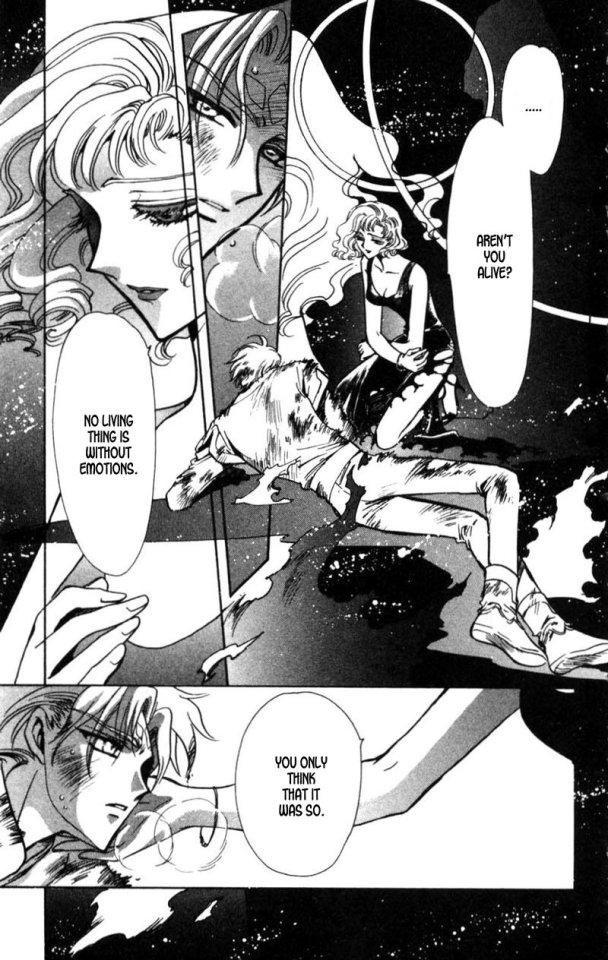
What's interesting is that Karen immediately felt connection to Nataku. It's the resembled, the empathy evoked based on echo of one's own past. Karen said so herself during vol18, Nataku has same eyes of a lost child she once had. She was drawn to them (I'm not sure how to refer to Nataku so I'll roll with they/them) because she saw her past self in them. That's why she's so bent on reaching Nataku's heart and making them realize they're human being capable of feeling emotions. Their pasts are also similar. Nataku grew up in a lab where they've constantly heard they're human-like creature with no emotions and one and only purpose: to be involved in World end business. Karen has been dehumanized all her childhood by her mother as well. Of course there was resemblce, no wonder Karen referred to Nataku as a child despite them looking like a grown up. Deep down Nataku is akin to lost child. But so was Karen long ago.

Again, it's interesting she chose to help someone who resembles herself but not herself per se. Maybe it was cathartic to show Nataku compassion and connect with them, maybe Karen deep down felt like she was helping her wounded inner child as well. Maybe being compassionate to Nataku is closest to being compassionate to herself she can get.
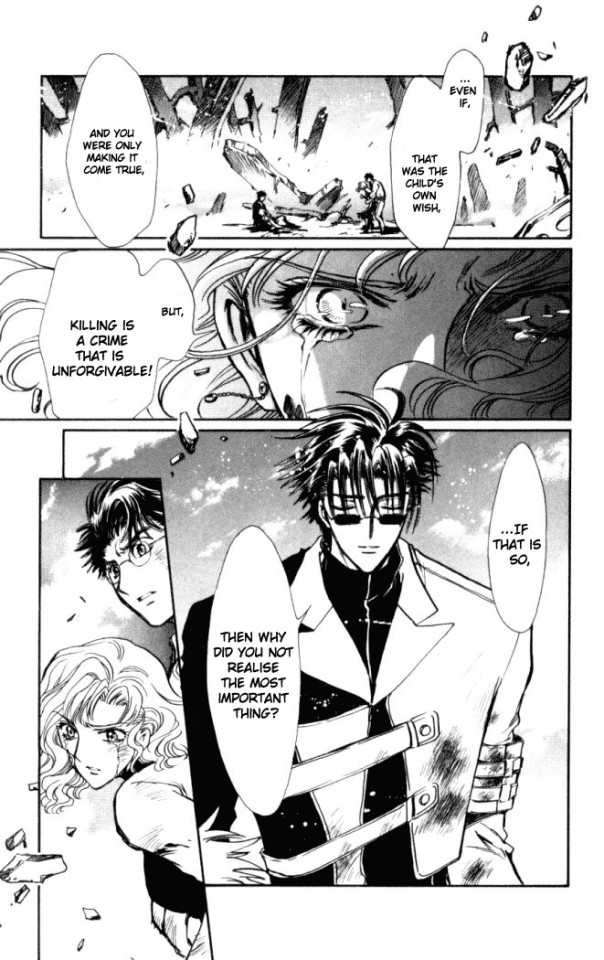
Alas, relationship with Nataku ended on tragic note because of their suicidal wish. Here Fuuma is trying to make Karen see the truth: if killing is such unforgivable crime, why is it fine to wish to be harmed yourself? Karen herself told Aoki in vol13 that agreeing to not weep after someone close to you dies is promise you should never make - then went out to defend Kekai herself where she could have potentially died. Just so she could protect Aoki. Nataku did the similar here: they loved Karen so much they'd die for her. That's a fatal flaw most of X characters have: they lost themselves in love they feel for others to the point where they failed to realize by letting themselves be harmed they ended up hurting their loved one. Fulfillment of such wish leaves noone happy.

If Fuuma turns out to be Judgment card, then this convo of theirs would be interesting since Judgement is about analysis of what dwells in own heart, wheras Justice is more about analysis of surroundings. Fuuma is trying to point out something about Karen herself and in turn she's deflecting that introspection while trying to find an answer in surrounding (examples of other people). She's biased in her judgemnt since she'd protect others while not caring about what happens to herself.
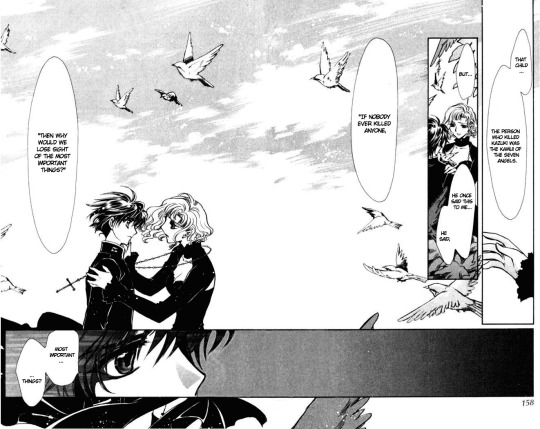

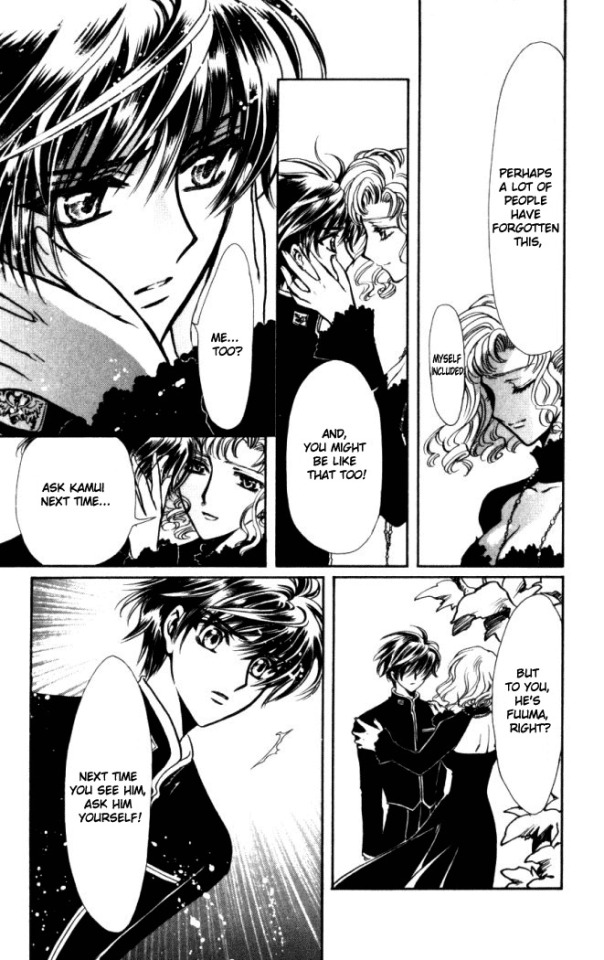
Nonetheless I'd say Karen is on right track to figuring out why her logic is flawed and that she can't protect others before she wishes to protect herself alongside too. Balance between compassion towards others and compassion towards oneself must exist for relationship between two to be stable. In any relationship two must be equal and same rules must be applied to both sides. If she realizes message Fuuma has been trying to convey then maybe she won't meet a terrible fate by the time X ends.
27 notes
·
View notes
Note
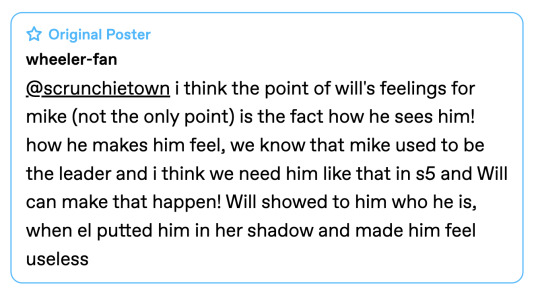
Am I interpreting this correctly, that you mean that Will’s feelings make Mike feel good and realise he is the leader, and that’s the reason they chose to give Will this storyline?
Well, immediately this makes me think that Mike, who thrives on approval and has low self esteem, would become rather attached to someone who shows him such love and makes him feel this way. It’s a classic psychological phenomenon. We often love people who love us, for better or worse. In this case, I would say better, because Will’s love for Mike is clearly being shown as something wholesome and wonderful. And choosing to be with someone who is good for you and makes you feel good… well, this is what love is. Mature love anyway, not the teen relationships explored in s3. It’s different from just attraction or infatuation, as I do believe Mike and El shared for each other in the early seasons.
I’ve seen you say that mike ‘loves el, he just does’ but whats the actual evidence in the story? Is it…
his actions? Mike’s protective and caring behaviour towards El all along has been lovely, but you could say it was exactly the same as his caring and protective behaviour towards Will both in s1 and s2, so why is one romantic and not the other?
Or is the evidence words? Is it Mike saying ‘I love you’ to El? Well, words are tricky things, and people often lie, even with the best intentions. S4 was about lies - look at Max, lying about Billy, but still we love her as she is human and her reasons make sense! And of course, Will lies about the painting, all with the best intentions.
But body language rarely lies, so what the writers have done, especially in s4, is to create two conflicting stories: one told through words, and one told through actions. This is the mystery of the byler/mileven love triangle and will be resolved in s5 when the story finishes.
You also mentioned love languages and the miscommunication between mileven being based in their love languages not matching. So considering that words aren't always truthful, that one of the themes of s4 in particular are lies and different perspectives of one story (also looking at you, Victor Creel and Henry!), then...
what have the writers done to show that Mike loves El and that his love is something she can feel and benefit from? Their love languages being unmatched is a very real possibility, and something that happens a lot in relationships. But unless they can overcome this obstacle by finding a way to express love for each other in the way the other needs, this relationship cannot work, because their love cannot work. What would mike and el need from each other for their love to work?
El would need to hear from mike that he loves her and she would need to believe it. Judging by the fact that she screwed up her face and started crying in powerless despair as soon as he said ‘I love you’, and the way she behaves afterward, with not even a reconciliation or conversation scene in sight, suggests she did not believe him and is in fact pretty peeved.
Mike would need El to make him feel adequate, important, special, like the paladin he is. But hang on, whose painting (and love) makes him feel that way? Will’s. As you said. What a strange choice by the writers if they wanted us to root for Mike and El's relationship. Why wouldn't we root for the people who make each other feel good to be together? Aka Mike and Will?
And this is without the unspoken frisson in the air between mike and will, the chemistry, the vibes, whatever you want to call it, because that stuff is super subjective - although personally, those things are what my gut instinct picks up on and what I find to be the best evidence for byler. It's too hard to explain or use as textual evidence, but to me it's the strongest thing. Why did I, a casual viewer with no bias or care either way, suddenly pick up on major, undeniable vibes between Mike and Will, happening at the very same time as a frontline plot about Mike and El's relationship being in decline?
The Duffers did something to make hundreds of thousands of people switch gears randomly to rooting for Mike and Will, and that stuff does not happen by chance, not in a TV show where everything is contrived and designed. Viewers are basically being constantly steered by the creator - that's what it means to be a viewer. You are being told, shown, the story they want you to see. That's storytelling. If you're lucky, they'll be clever about it, throw in mystery and ambiguity and make you feel so invested and excited that you are arguing about it on the internet over a year later... lol. Of course the duffers want people talking and arguing about their show! It keeps it alive! What they have done is so so clever.
In short, we can argue forever, but a lot of it comes down to your personal subjective life experience and how you interpret the world. We will never know until the story is resolved - as we shouldn't. How boring would that be, to have predicted everything? I'm sure there'll be plenty of unexpected things for both bylers and milevens.
it's a very long message😭 I'll try to answer as best as I can - I'm sorry you had to wait so long for the answer, thanks for ur time!
*the first thing, about my own message. I don't think it's the only reason they gived him this storyline, bc it's his own storyline- IT CAN'T BE ABOUT MIKE!! his feelings are not just about mike but it shows a lot about himself! his feelings for him are very complicated- let's focus on the fact that being gay in the 80s is something terrible, you can literally get bitten up or even killed for being a part of lgbt! he's scared of it, he actually says a lot about what this feelings are doing to him, and what makes the situation even worse? the fact that Will KNOWS that mike is not interested, that mike loves someone else, that mike will reject him. He's in so much pain, and the fact that mike love interest is his own sister probably makes it even worse. Will is a really sensitive person, i think he's scared that el could think that he wants to steal mike from her or sth. The feelings are not nice to him, he's hurting and i think that it's an important way to develop his character, to get him off someone's shadow, to make him independent and happy- bc even in s3 we can see how hurt he is that everyone moved on and he's still here, he needs his friends and he can't feel better about himself and his trauma without them by his side. We see him as a part of the group, the quiet kid but he's so much more!
personally as a mileven shipper i think that ruining byler would make no sense, bc why duffer brothers fixed them this season just to ruin them again ? no it's stupid, second thing, even if mike doesn't love Will that way he still loves him!!! Will is his best friend from kindergarten, he won't just kick him out of his life bc he's in love with him? and milevens who actually think like that are just stupid sorry guys 🤷🏾♀️ you can don't like a ship but let's remember that will is an important person in mikes life and he won't just get rid of him. In my opinion the duffer brothers didn't put the love for mike to will's character to make them together and give him a happy ending he deserves this way, it's actually too easy and it doesn't make sense since they are still working on mileven, they could just make will fall in love with someone new but no! i think that mike plays an important role here, he is the heart!! he was there for will when his life was falling apart even if he was depressed and needed help too. The fact is that mike is clueless rn, he doesn't know yet what Will feels to him bc Will was talking about himself from inside of the closet- he was talking using eleven. This helped mike to feel a bit better about himself bc in the van scene we can hear that he feels useless and weak in a relationship (the important thing is that he told el in a monologue "I'm scared that one day you'll realize you don't need me anymore" when in the van scene he told Will that he thinks she ALREADY knows it and is about to leave him.)
* I want to say something about the final scene from s4 here :)

look, eleven is in the front bc she already had her character development, she was feeling like she's the monster and that no one loves her for herself, now she's going to fight vecna, get a revenge, get a justice for max, and she's going to prove to herself that brenner WASN'T RIGHT about her when he said she's not ready (mike said to will that they had talked a bit about this!! so we know that at the end of s4 she's just isolating herself from everyone and she thinks that it's her fault what happened to max bc she wasn't ready!)
then we have will&mike together, i think their storyline is really important, bc mike feels that he's not enough and then will said to him that it's not true, that he's the heart! and my theory is that: mike is going to be the leader again (reference to s1) and won't be in el's shadow like he used to, he will be independent and El wil be independent too!! they'll see that they both are worthy something, and they will be something more than just a silly teenagers relationship! both of them.
And about Will, i think that after a coming out scene they'll talk a lot, heart to heart, because Will needs to be independent too! we can see how his happiness depends on Mike, we can see how he puts Mike's feelings in a main focus and does everything to help him fix his relationship bc he knows that mike won't be with him- see? he feels bad but at least he wants the person he loves to be happy if he can't, and Mike is going to change that! for sure! but not in the way you guys think, he won't be with him, he will show him how worthy he is on his own! because Will thinks he's a mistake, he literally said that he feels like a mistake, and I'm sure Mike will show him that there's nothing wrong with him, with the fact that he's gay, and even with the fact that he's in love with him, he will make him feel good about himself (that's exactly what will did to mike in a van scene, but not as himself but as eleven bc that was what mike needed) now it's mike turn to make will feel good about himself, but no with being in a relationship with him, Will needs to move on, to see that he's not a mistake, that his life doesn't depends on Mike's, that he can find happiness without mike, and eventually i think it's going to be one of the best characters development in this show. There's something way more important with making Will happy than putting him in a relationship, he needs to feel good about himself at first.
*also i would like to say that i would never ship mileven if things between them would have to stay the way they are now. I'm not shipping an unhealthy relationship just because "they both love each other 🥺🥺" no, i believe they'll fix the problems! and if they don't, then I won't ship them anymore- the thing i need the most are mike and el being happy, and i truly believe that they still can be happy together they just have to work on it.
And for example, pointing the fact that mike is my fav character: if he would be in love with eleven, but i would clearly see that eleven doesn't love him back, then i would never ship them together only bc my fav character loves her- this is stupid, I don't want my fav character to feel that he's not enough, that he doesn't deserve the love bc this specific person doesn't love him back, i would rather him to let go, to find happiness in himself and maybe in a future in someone new.
The only thing that doesn't make me feel that byler shippers are crazy is the fact that you guys think it's NOT one sided, well i find it weird bc for me it's pretty clear that it is 😭 ofc everyone can understand a character in a different way!! but there are people who ship byler but say "i ship byler but Will deserve better" and ummm so why do you ship it then?? if your fav character is hurting bc of the feeling he had for someone, if your fav character feels like a mistake bc of it then why do you ship him with that person?? i will never understand people like this i swear.
actually i feel like this is totally off the topic of your question 😭 but I can't make you understand my point of view on mileven or byler if you think that mike is in love with Will bc that just won't work 😭 and i think that there's nothing wrong with that:)
3 notes
·
View notes
Note
Hello~ how are you doing? I really like your meta posts about star wars they all cause me emotional damage but also thoughtful.
First I want to say that I'm relatively new to SW fandom and universe. I watched the trilogy a long time ago, but just now that I decided to know more. I watched the movies and series (currently watching tcw animation), besides of what is Disney canon I only have some informations of what happens in the Legends.
Anyway, I said this all because I have this doubt in my mind since I watched the prequels, and this only got stronger when I re-watch the saga. Was Anakin destiny to fall?
And this lead to another doubt, because I don't really know what is determined by the Force or is free choice.
I'm not Anakin apologist. I just fail to recognize a path where he fulfilled the prophecy without falling in the dark side. Tbh, I feel like he always was one step to the dark side, always in the limit... I don't think I'm reading correctly, because in the end, he chose it. Just like Reva chose to not kill Luke.
Anakin chose to follow the dark side over and over. And yet, I still wonder if he really had a choice? Am I being coherent here? Probably not :')
You're definitely being coherent haha! And thank you for this question--I was literally just talking to my friend about this the other day, so I'm glad to have a chance to flesh out my thoughts :)
The whole point of Anakin is that he loves so deeply it's unhealthy and it burns him up from the inside out. He ties himself so deeply to those he loves that he struggles to handle things involving their relationships with him in a reasonable way. These issues stem from his childhood, and they're never adequately addressed; it's likely he never even consciously recognized how dangerously deep his attachments to others ran. This makes him vulnerable to manipulation, which is exactly what Palpatine takes advantage of.
Anakin did make a very distinct choice: he is accountable for his actions and in the end he did know what he was doing. But I don't think that, at least at first, he realized what the root cause of his actions truly was. When he first turns to the Dark Side he's not consciously doing it for selfish reasons--deep down, it is a selfish desire for control and ultimately for power, but in his mind he's doing it because he has to: he is trying to save Padmé's life and overthrow what he views as a corrupt regime.
This persepctive is a direct result of Palpatine's influence. Palpatine groomed Anakin from the time he was a vulnerable and traumatized child through his adulthood. He leveraged his access to Anakin to put himself in a fatherly role in Anakin's life-- someone who he trusts and who seems to be the only one who fully trusts him and his judgement is naturally going to be more appealing to an immature and desperate young man than the often-restrictive Jedi order and the expectations he can never seem to live up to.
Palpatine very intentionally plays into Anakin's heightened impression of his own responsibility and power (caused by his awareness of his status as the Chosen One), and Anakin's simultaneous sense of utter powerlessness and loss (caused by his childhood as a slave, the suddenness of his departure from Tatooine, and the death of his mother) by making it out to be that Anakin, and only Anakin, has the ability and the right to determine how things should be. Not only that, he removes the only support system Anakin has by sending Obi-Wan to Geonosis and framing Padmé as a victim--as Anakin's victim--if Anakin doesn't use his power to save her.
To his credit, Anakin initially resists. He's opposed to Palpatine at first, so Palpatine pulls on Anakin's attachment to him as a father-figure (despite what Anakin had just witnessed) to goad him into killing Mace Windu.
As the lightning arcs across the room, connecting the two men in front of him in a violent and burning display, Anakin watches, his own battle raging inside him. He knows what is right, and in truth he knows he is powerful enough to stop Palpatine. He is the Chosen One. He is fated to bring balance to the Force. He could choose that fate: he could save Mace and stop Palpatine. But Anakin allows what Palpatine offers, and what Anakin himself feels, to blind him to the truth he had just recognized. Choosing the right is choosing to sacrifice what he wants, what he loves, and he will never do that. That scene is a representation of Anakin's internal decision as much as his physical one: in the moment he kills Mace Windu, he chooses to attack the good in himself instead of the evil, and commits himself to the Dark Side.
The tragedy of Anakin's fall is that it could have been prevented, in some other life. If he was protected from Palpatine's influence; if he had been able to see his mother before her death; if he had been shown how his attachment was unhealthy and why, and taught how to love people without making them his entire universe; if he had talked about these things and listened to the counsel he received; then it would have been different. But it would have been different because he would have been different. He was shaped by what happened to him and those around him, and changing those things would have made him into someone who would never have chosen to fall. Who would never have felt like he needed to. Who, perhaps, would never have wanted to. But as it was, he had a furnace in him, and others saw that and stoked the flame, and Anakin chose to let it consume him.
So in the end, it's a both-and situation: what happened to Anakin was both fully Anakin's choice and never only his choice. The circumstances and plans of other people intersected perfectly with the kind of person Anakin was naturally, which was shaped by his childhood experiences, which was shaped in part by the Jedi and in part by simple chance, and Anakin's own determination of the person he wanted to become. Ultimately the final decision was made by him--he recognizes himself that he killed Anakin Skywalker--but it's impossible to assign sole blame to any one party for all the decisions and factors that led him there. That's just how life works: nothing happens in a vacuum, and it's impossible to tell what the tipping point is, because everything is entangled in ways we can't describe. And in that way, I suppose you could call it fate.
But fate is never stronger than will. The true tragedy is that even after all of this, Anakin was presented a way out, through Obi-wan, and he chose not to take it. Who can truly know why we cling to what destroys us? But he did, as so many of us do. He chose a path of suffering and cruelty and death, and he walked that path for many years.
But in the end, he chose to turn around--and so can we. No one is ever truly beyond the point of saving. We always have a choice. And that is what I think is most important of all: no matter why we fall, we can always rise again.
#star wars#anakin skywalker#darth vader#meta#sheev palpatine#my meta posts#responses aka the ramblings of my brain#kay can i just catch my breath for a second#quality meta seal of approval#not to hype my own post up i just put that on all meta posts so that i can find them#obi wan kenobi#i feel like i'm really channeling him here lol 😂 we are basically identical but i really do think this is how he thinks of anakin as well#never beyond saving but choosing not to listen#how tragic is that?#but he is saved in the end. the good that was unfinished is completed. and they will laugh together yet#to paraphrase my boy tolkien#(also yes for my mutuals if you're seeing christian themes here that's intentional 👀)#kay has a party in the tags#rots#hopefully that answered your question/was at least clear! it was frickin long but hey 😂 hope you don't mind!
12 notes
·
View notes
Text
dude i’m so sad about culture today idk why maybe it’s bc i finally got batteries for my boombox and went cassette/cd shopping yesterday and have thus been listening to physical music exclusively, and it’s making me super nostalgic.
idk i know i’m becoming a shaking-fist-in-the-sky millennial just as the boomers did to us but it doesn’t even have anything to do with the younger generation, who i clown on bc i’m getting old but i have great respect for in many ways (fierce albeit often misguided sense of justice, highly creative and intuitive, much kinder and more empathetic, nonconformist).
my problem is with the powers that be that are manipulating cultural production more than ever before through incredibly sinister means, which we’ve just accepted...
and i do believe that because the younger gen has not seen the evolution of social media from the beginning, they are a bit (understandably) naive to the evils of it? the corporate supergiants know this and are blatantly exploiting it, manipulating narratives, feeding us content that targets our specific weaknesses and struggles for profit, generally just being the sole deciders of culture itself. and it’s not our fault as consumers of course.
but i also fear that there is no turning back from it all - surveillance and data mining, industry planting, the increasing bombardment of what are often disguised advertisements, the powerlessness and resulting decay of authenticity/innovation/self expression on behalf of the public despite our efforts. we no longer have any control over what we consume. the culture industries have always been evil, but beginning with facebook, they have become much much smarter and have us all in a complete vice.
i’m approaching my saturn return and more than ever before am experiencing feelings of grief in many senses, i’m uncovering lost memories, i’m diving into my traumas on purpose bc i’m desperate to finally heal - it’s necessary at this point of my life, now that my identity is becoming more solidified.
and i guess that grief includes the detachment i’m so desperately fighting from my roots, what i’ve known and loved, and i guess if i’m being honest with myself, what and how i’ve consumed. i’m mainly thinking about music here, and other media too, but my number one love in this life is music and social media has absolutely ruined what little integrity the music industry once had. the consumption of music has lost much of its intimacy for me, because i know the tangible harms of streaming, algorithms, and so on, and how i’m actively lining the pockets of billionaires at the expense of not only myself but the artists i cherish.
anywho, this became a really tangential rant, but damn, the closer i get to 30, the more disconnection and yearning i experience. this is a painful time for me generally speaking, very introspective. and thank god i now have the tools to cope with it all, i know who i am, my feet are mostly firmly planted to solid ground. to end on a positive note...
and i always have my memories, and i always have my cassettes and cds and artifacts from a time when we could express ourselves for expression’s sake.
12 notes
·
View notes
Text
Waiting Waiting Waiting
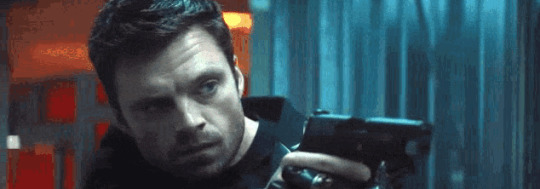
summary: When Bucky’s recklessness in the field starts to add up in bruises on his body, you take it upon yourself to keep him safe - since he clearly won’t do it himself.
pairing: bucky x reader
word count: 5.2k
warnings: canon level violence, self-sacrificing idiots
a/n: this was based off a request by @im-just-star-dust and anonymous from months ago. Please enjoy your stubborn dumbasses in love 😌

As easy as air filled heavy into your lungs and as natural as the sun as it rose each morning in pinks and oranges over the horizon, you fell in love with Bucky Barnes. So subtle, it snuck up on you before you could realize it had consumed you entirely. This love you held for him. This lightness. This joy.
But it was moments like this – moments when he limped off the ramp of the quintet nursing a broken forearm to his bruised ribs, when his face was littered in colors that weren’t his own, angry red scars to match the faded pink ones under his suit, and blood caked deep into his roots. Moments when the violence he endured could not be hidden under the sweetness of his smile. Moments that chipped away at the very foundation of your heart.
The act of loving did not come as easy as the fall. Often, it hurt.
With no inhuman abilities of your own, no affinity for specialized weaponry or martial arts, you were left waiting for him to be returned to you battered and bruised. You were powerless against the demons Bucky faced beyond the walls of the compound; helpless to the pain he swallowed and the danger to his life at the end of a barrel.
You had thought once that there would be relief when he came home, when you could see him with your own eyes and know that he was still whole, still alive and breathing and smiling so sweet you almost could see past the blood caked through busted lips. It was foolish to believe that sense of helplessness would not linger. It stayed with you, untouched and unbridled, even in the quiet moments.
When Bucky held you under the thin stretch of cotton sheets, his lips feathered over your forehead in a dreamless sleep, it remained— this knowledge that he would soon run toward a violence he might not return from. That he might one day leave you waiting for him at the edge of the landing bay for the rest of your life. Waiting. Waiting. Waiting.
The love between you was made of both grace and destruction. Salvation and penance. Gift and poison.
Still—you held on.
You held on until your fingers bled.
“M’okay, honey,” Bucky mumbled through the swelling of his broken lip before you could ask.
Your hands hovered over his body, inches away from the blood soaking through his suit and the discoloration on his skin, terrified to touch him as if it might unravel him where he stood. He looked too fragile for a man so unbreakable, too resilient to the torture the world had inflected upon him. You still hadn’t caught your breath from the sprint across the landing bay. Tears were burning in your eyes.
“Sweetheart, I’m okay,” Bucky stressed again. He set the cool palm of his left hand against your cheek, urging you to look at him when you couldn’t find your focus. Ocean blue eased as you settled in his gaze; a silent bond between you so palpable you could have touched it with your bare hands. It allowed your heart to calm.
Bucky pressed out a gingered smile for you, though he winced at the effort. The split in his lip cracked with use. The slight flash of pain on his features shattered what remained of your resolve.
There was nothing you could say to take away the wounds he sustained; the injuries he would carry with him each time he came home. This time he was still alive and, perhaps, you should have been grateful enough for that. But then you saw Steve standing only a few feet away with a remorseful look in his eye, his body barely touched of the violence that Bucky wore and a sinking feeling tugged at your gut.
Bucky was too reckless in the field, too determined to atone for sins that did not belong to him that he didn’t care about the pain he sustained in the process. He didn’t care if he came home broken and bloodied if it meant another name could be crossed off his list, if another Hydra compound was destroyed to ruins. If Steve could walk out without a scratch, he’d done his job.
To Bucky, it was an act of redemption. But to you, it was a desperate attempt at an absolution that would only serve to break your heart. His sacrificial wounds would turn deeper, they’d cut harder, and one day he would come home draped over a stretcher, a thin sheet covering the lifeless, glossy haze in his eyes, a limp arm hanging over the edge. The vivid image clung to you, haunted you in your dreams. It chased you as if it might one day dig its claws to your spine and consume you entirely.
Agony.
Sometimes, loving him was agony.
“What’s the damage?” Bucky asked Dr. Cho as she examined his arm.
You hadn’t even noticed the walk to the med wing, but you felt the firm touch of Bucky’s left hand in your own. He squeezed it gently, cautious eyes glancing in your direction as you lost yourself to your own thoughts. He clenched his jaw to hide the short wince of pain as Helen maneuvered his injured arm.
“Given your usual rate of healing, I’d estimate thirty-six hours before you’re back at baseline,” Dr. Cho said, sliding the clipboard of Bucky's previous injuries back into the filing cabinet. His folder was wider than the others, littered with dozens of needless injuries. And those were the ones he actually sought medical treatment for.
“Good,” Bucky nodded, looking to Steve. “That’ll leave us enough time to get back out there before they make the next drop.”
Your heart lurched. He couldn’t seriously be thinking about shipping out on another mission... not this soon. You usually had a week with him before he left again. A week to remind yourself that he was safe and strong enough to handle the worst that Hydra threw at him. You needed time with him. Time to memorize him again, to hold onto him like you might not ever get the chance again, to tell him you loved him and to feel his body wrapped around yours.
You needed time.
Steve’s arms folded over his chest, a heavy sigh burdening his chest. “Buck, I don’t think that’s a good idea. Maybe you should let yourself rest and then maybe we can—”
“There’s no time to rest, Steve,” Bucky argued. His hand was still laced with yours and you could feel the heightened thump of his heart, even though the metallic. “Hydra’s out there manufacturing weapons and shipping them anywhere they can make an easy dime! It’s running cities into the ground, Steve! Killing people out in the streets! I’m not just going to stand by and let it happen.”
“No one said to stand by,” Steve eased, raising a hand in defense. The other settled against his belt. “I need you in one piece. You’re not good to me if you keep ending up in this room.”
“I have to get back out there, Steve! Who’s going to protect those people if not us?!”
“Who’s going to protect you?”
Bucky’s gaze shot to you at the sound of your voice, your hand quickly slipping out from his own as you stared blankly back at him. You shook your head, tears welling in your eyes. They burned of embarrassment and neediness and a longing so deep and painful you could hardly breath, but you couldn’t stop them before they touched your cheeks. They were rivers.
“Who’s going to protect you, Bucky?” you demanded an answer, your voice breaking in the effort.
Bucky’s face fell. A sudden, paralyzing grief racked his features. He shot a glance towards Steve, who gave him a short nod of understanding and escorted Helen from the room. When it was quiet again, Bucky reached a hand out for you and you came to him easily, as you always would.
He wrapped you in his arms, soothing the tremors in your spine as your tears continued to fight their way to the surface. He rubbed his left hand along your back in slow circled, his lips grazing tenderly over your forehead.
“There’s a lot of people out there who need our help,” Bucky whispered. “I have a responsibility, an obligation, to do what I can to make a difference.”
“Not if it means sacrificing yourself in the process,” you pressed, knowing damn well he didn’t agree with you, but he didn’t try to argue the point. He didn’t say anything at all, and perhaps it was better that way. You’d been through this conversation too many times to believe there would be another outcome.
Bucky would always believe that his life meant less than anyone else around him. He didn’t allow himself to consider the possibility that to you, he was everything.
You sniffled, pulling back from his chest. He smiled sweetly at you as he brushed away the lingering wet stains on your cheeks, his thumb gently running under your eyes.
“What if...” you started, taking in a full breath, “What if I go with you?”
The lightness in Bucky’s face fell. He dropped his hand.
“You know I’m good with computers,” you added, quick to notice how easily he closed up, how he’d already made up his mind before you could even begin your argument. “It would be a lot easier to hack into Hydra’s mainframe while I’m in the room instead of hundreds of miles away. You know that.”
Bucky clenched his jaw. “Who said we need to hack their mainframe?”
“You did. Right before you left on the last mission,” you pointed out rather smugly, though Bucky was not amused. “They’re selling the weapons through the black market. It’s an online hub, Bucky. If we’re on one of their networks, I could trace them. I could help you.”
“You have no field experience,” Bucky shot back plainly. “You can’t fight. No. No way in hell.”
“It’s a good plan, Bucky. And that way, I can be there to watch your back and—”
“I don’t need you to look out for me, Y/n. You’re not trained for it. The risk is too high.”
You stepped towards him, reaching out towards his hand but he felt miles away. “If you would just listen to me, I could—”
“Dammit, Y/n, I said no!”
You clamped your lips together, holding your breath. Bucky rarely ever raised his voice, let alone at you, and he recognized the anger in his tone the moment it left his lips. It drained just as quickly as it arrived, a sadness replacing the hardened features.
“I’m sorry. Sweetheart, I’m sorry,” he murmured. He reached a hand towards you, stretching his fingers in hopes you might meet him half way. You slid your hand into his, allowing him to tug you back to his embrace. With your head pressed to his chest, you listened for the steady thump of his heartbeat. Solid. Even. The most beautiful sound you’d ever heard.
“Please, forgive me. I didn’t mean to yell,” he sighed, the quiet vibrations of his voice settling in his chest. You pressed your hand against his heart, capturing the waves on the pads of your fingers. “I’m trying to keep you safe, Y/n.”
“Who’s going to keep you safe, Bucky?” You swallowed, though it burned. “I just want you to come home to me."
“I will. I always will,” Bucky replied quickly, sternly, and you had hoped maybe you might believe him as he said it. But not even his own words were laced with enough conviction for that.
It was a foolish promise anyway, perhaps a selfish one, and maybe you were cruel for asking the universe to protect one man over the lives of so many others. But he’d been through enough, hadn’t he? He’d sacrificed enough. Could the universe not show him this one kindness? Could it not allow him time to breathe and to be loved and cherished? Could it not go another day without cutting his skin and bleeding him dry?
The universe did not care to protect Bucky the way you did.
The cool touch of a calm determination settled through you. If neither Bucky nor the universe itself would bother to keep him alive, then you’d do it yourself.
***
He was going to kill you for this. Bucky might actually kill you for this. If you survived, anyway.
You knelt behind the crates of storage in the back of the quinjet. Your legs had grown sore and numbed from the hours cramped in the tight corner, hidden from Steve and Bucky’s view as they descended into their point of contact. It was a miracle you were able to sneak on board without either of the super soldiers noticing or the SHIELD crew at the landing bay.
You adjusted your grip on the gun you’d taken from Bucky’s bedroom; the simple Glock he kept stored in the nightstand drawer beside his bed. He’d shown you once how to use it within the security of the range below the compound. You could still feel the kickback in your shoulders, the echo of the shot ringing in your ears. It wasn’t a pleasant feeling, but you remembered enough to know how to release the safety, point, and pull the trigger.
“What are we looking at, Steve?” Bucky’s voice carried from the cockpit. Through the cracks between the crates, you could make out his figure blocking the stream of sunlight through the dash. A hand set on his hip, the other leaning his weight against the empty copilot seat. It was as if a burden laid over his shoulders, sinking into his muscle, exhausting into his bones.
“Twenty or so hostiles,” Steve confirmed, nodding to the Infrared monitor. “Six walking perimeter by the gates, the rest by the loading dock. We should take the six standing guard first and then make our way to the water where they’ll be cornered. If we stick together, it shouldn’t be— Bucky! What the hell are you doing!”
The ramp began to lower at the back of the plane and you clung into the mesh along the wall to keep the wind from picking you up and sweeping you out the mouth. It was deafening in your ears – the violent rush of air spilling in from the opening. Hair whipped around you, wind stinging against your skin. Bucky stood unbothered near the opening, casually loading his weapons and adhering them to his suit.
“I’ll meet you down there, pal,” Bucky winked, playfully saluting his captain as he jogged to the edge. Your heart leapt to your throat as he neared the drop and you closed your eyes, turning away before you could watch him jump from the plane. The unused parachute was still nestled into the straps along the wall.
“Pain in my goddamn ass,” Steve grumbled under his breath as the ramp began to close.
Your knuckles ached by the time you let go of the mesh on the wall of the plane. Hair tussled in messy strands over your face. But it was your heart that pounded so painfully in your chest you wondered if it might jump from your ribs and bleed you dry.
What the hell was Bucky thinking? Disregarding Steve’s plan, jumping out of the plane without a parachute. Facing twenty-some mercenaries on his own. Was he after a death sentence? He’d promised he’d always come home to you, hadn’t he?
The quinjet eased as it landed in the open parking lot behind the warehouse and Steve wasted no time as he grabbed his shield and sprinted to the open ramp. When you were certain you were alone again, you finally allowed your legs to stretch as you stood. Your joints cracked, the muscle screaming for being cramped in such a small space for so long.
You looked down at the gun in your hand. It was heavier than you remembered. Weighed down by the metal, the bullets, and the lives you might take in exchange for Bucky’s. He certainly wasn’t going to defend himself. You’d have to do it for him.
You gritted your teeth as you made your way to the ramp. It didn’t matter in that moment that you hadn’t been trained the way Sam or Natasha had. It didn’t matter that your skillset laid behind a computer screen, safe in the compound and away from the danger Bucky worked so tirelessly to keep you from. It didn’t matter that your heartbeat was echoing in your own eardrums, that your legs were trembling with every step.
None of it mattered because you knew the consequence of staying on the sidelines. You knew what could happen if you’d done as Bucky told you, if you’d stayed behind and waited for him on the edge of the landing bay. Waiting. Waiting. Waiting.
You knew he might not come home.
A cold determination iced through you as you stepped out into the open parking lot. In the distance, the sound of gunfire rang out against the sticky sweet smell of the saltwater by the marina. You flinched at each echo as it bounced against the warehouse you approached.
You slid along the wall, cautious to check your surroundings before moving forward. Bucky's gun was held tight enough in your grip, your fingers locked. The safety was already released.
By the time you were able to get a clear look around the corner to the open loading dock behind the warehouse, Bucky was already engaged with four assailants. The rest were laid in heaps on the floor by his feet. You caught a glimpse of Steve’s shield in the distance as he fought one of the guards at the perimeter. Too far away to rush to Bucky’s aid if he needed it.
It was agonizing to watch. Bucky held his own as you expected he could, but it was still four against one. One of the men jabbed the sparked end of a baton into Bucky’s side, igniting electricity into his ribs as he cried out. You bit down on your tongue enough to taste blood and before you could spit the copper from your lips, Bucky had already snapped the man’s neck.
The next approached and Bucky moved to fire his weapon, only to find the chamber empty. Instead, he chucked the gun at the man’s head, taking the stunned moment of shock to kick him in the chest hard enough to launch him into the air and slam into the wall. His body cratered around the concrete before he slid to the ground.
While Bucky fought the third, the last man hung in the wings. You watched him, cautious of the way he was studying Bucky’s movements, calmly pacing around the fight. A hand touched the gun placed on his hip – a quick flip of the safety, the reflection of metal under the burning sun. Your heart lurched.
It happened so quickly, you barely registered what you'd done until you felt the kickback in your shoulders. The man was on the ground, gun still placed in its holder against his hip, a permanent look of shock upon his face as blood seeped into the pavement around him.
Bucky whipped around towards you; hands taunt into fists, jaw locked and blood dripping down the side of his face. His gaze slowly shifted from the gun trembling in your hands to the stunned expression upon your face and his steadiness faltered. Desolation warped his features.
“...Y/n?”
Another gunshot echoed from inside the warehouse and Bucky lunged at you. You slammed against the pavement, Bucky’s weight sinking you into the stones, though his left hand took the brunt of the impact as it cradled the back of your head. As bullets cut through the air and buried into the shipment crates beside you, Bucky quickly dragged you behind one of the barriers. He pressed his back to the crate, stealing a quick glance at the mercenaries before jolting back into place, barely moving out of the way of a bullet that had nearly grazed his forehead.
Bucky gritted his teeth and wordlessly held his hand out, palm up. His stare was focused on the water, jaw wired shut. You glanced at his face, though he looked too angry to even speak, and you cautiously set the gun in his grip.
“Bucky, I—”
“What the hell were you thinking?!” Bucky snapped. He adjusted himself to his knees and fired two shots back at the mercenaries before he slumped down out of their sight. “Are you insane? Is that it? Are you trying to get yourself killed?!”
You shook your head, tears welling in your eyes. “N-No! I just—I just wanted—I wanted to keep you safe...”
“I have to keep you safe! You’re all I have! Don’t you understand that?!” Bucky shouted, his voice breaking at the effort. The look on his face sank knots deep into your stomach before he turned and shot another three bullets. He tossed the gun to the side, the bullets emptied from the chamber. He hit his head against the back of the crate. “You can’t be here, Y/n. You can’t be here.”
“Someone has to look out for you!” you argued, cheeks wet with tears. You paid no mind to the echo of gunfire behind you. “You keep ditching Steve and taking the brunt of the attack every chance you get! You don’t think about yourself when you’re out here! You take every punch and bullet until your body can barely stand it! You don’t even consider what it would do to me if one day it was too much, if you took one bullet too many. If you keep going like this Bucky, one of these days I’m going to be waiting for you to come home and—and—you’ll be—”
Bucky tugged you into his arms. His left hand slid sweetly down your spine while the right cupped your cheek. His thumb gingerly brushed away the tears as they fell. It was a moment entirely too sweet for the violence approaching behind you.
“Okay, honey. I hear you. I’m sorry,” Bucky eased. He pressed a kiss to your temple. “I promise, I’ll be more careful for you, but we still have to get out of this mess first, okay?”
You nodded, brushing your eyes against the soft sleeve on Bucky’s jacket. He stole a quick kiss from your lips before he pulled a gun from the strap on his ankle. A calm washed over him as he readied himself for the attack again. Just as he was about to return fire, a bullet lodged into his shoulder.
“Bucky!” you screamed, instinctively lunging towards him but he held a hand up in warning, though it trembled. He clenched his jaw, moving to aim his gun when another bullet pierced through his ribs.
He stumbled back a few paces at the impact, startled as stunned eyes drifted down to his stomach where blood began to seep through the fabric. He touched his fingertips to the crimson. Vibrant red and sticky wet against his skin. He met your gaze, a new kind of fear seeping into the ocean blue waves. It only took one more bullet to push him over the edge of the dock and into the water.
There was no hesitation. You dove in after him.
The water hit like ice against your skin. Steam could have burned to the touch from the fire inside your lungs as you swam after Bucky’s sinking body. Clouds of red followed him in his decent into the darkened waters, dragging him to the bottom.
The pressure in your ears was screaming by the time you latched your grip to the straps on his jacket. When you tugged him towards the surface, nearly all the air had escaped your lungs. He was too heavy. His arm was weighing him down. You cried out, watching the bubbled leave your lips.
You turned to Bucky, his hair floating amongst the faded crimson in the water, his body limp to the waves. You touched his cheek, felt the slight prickle of stubble along his jaw and the gentle bump of a faded scar. This wasn’t how he was going to die. You wouldn’t allow for it.
Colder than the water encasing your bodies, threatening to pull you into its tomb, a determination swept through you. You hooked Bucky’s arm around your shoulder and kicked off from the leg of the dock and swam for the surface. You didn’t stop until all the air had been burned from your lungs and your vision began to blur.
When you finally broke surface, Steve was hanging over the edge, desperately extending his hand to you. Still, you clung to Bucky, terrified to expose him to the open surface.
“They’re dead,” Steve confirmed. “It’s clear up here. Hurry, Y/n!”
You nodded weakly, shifting Bucky in Steve’s direction so he could pull him from the water. Steve groaned at the weight, dragging Bucky up onto the dock with a heavy thud. His hands moved quickly to Bucky’s chest, quick compressions and the sharp snap of a rib as you climbed out from the water and crawled towards them. Bucky’s body shook with each compression. Panting and dripping wet with salt water, you set a hand against Bucky’s arm, stunned at how blue his skin had colored.
Then suddenly, Bucky jolted upright, water spilling from his mouth in violent coughs. You rubbed your hand along his back, sweeping his hair back from his eyes until the coughing subsided. Steve sat back on his heels, relief washing over his face.
“You’re alright,” you eased, cautious eyes drifting to the bullet wounds littered over his torso. Brushed clean by the water, only glimpses of the deep red remained soaked into his jacket. “You’re okay, honey.”
When his eyes met yours again, a sliver of shame curved into his features. “That’s twice now you saved my life.”
A smile pressed along your cheeks, though it ached in the effort. “I said you needed someone to look after you, didn’t I?”
He nodded weakly, sinking back onto the dock. Closing his eyes, he started to laugh. It was soft and a little strained as he pressed a hand to the open wound in his ribs, but still kind. Still beautiful. “You’re not coming on missions with us now, just so you know.”
You scoffed, the humor void in your tone. “That depends on whether you’re going to start acting like you actually want to survive.”
Bucky’s eyes snapped open and he met the painfully serious expression on your face. His smile faded away.
“I do,” he implored, gathering your hand between his own. He peppered your knuckle with gingered kisses. “I swear it, honey. I do want to survive. I want to come home to you. Always.”
You rolled your eyes. “So stop jumping out of planes without a parachute! Stop running headfirst into gunfire! Stop ditching Steve so an actual trained super soldier can watch your back! That way I won’t have to sneak onboard your next mission and keep you from getting shot or—or drowning! You impossible, reckless, self-sacrificing—”
Bucky’s lips were on yours. His smile bright against your mouth as his fingers curled into your damp hair. Slowly, as his lips parted yours, you sank into his touch. Relief and agony and love and hurt all rolled into one single kiss and you could taste the saltwater against his tongue. He sighed to your breath, peppering sweetened kisses to the corner of your mouth.
“Deal,” he grinned, stealing another chaste kiss before he pulled away. “You swear to me right now you won’t do something this stupid again and I promise I’ll never be beyond five feet of Steve Rogers in the field again.”
“I don’t know if that’s necessary...” Steve raised an eyebrow from his position leaning against the weapons creates several feet away.
Bucky chuckled, shaking his head. The wet stands of hair dropped water like raindrops against the pavement. Despite the bullet holes in his chest, Bucky still had the nerve to laugh, to smile. You wondered if the serum took his pain or if he was simply focused on brighter things.
“If I can keep you from running out into the field after me like this, I promise you won’t see more than a scratch on this body again,” Bucky swore, his hand gently resting against your cheek. His thumb brushed tender strokes over the softened skin.
“Don’t make promises you can’t keep, Buck,” you warned, a grin pushing at his fingers.
“Fine,” he laughed. “How about I just promise I’ll do the best I can, okay? I’ll be careful. I’ll remember I’m coming home to you. Trust that I won’t risk that for anything.”
You nodded, relief touching your heart for the first time in the years since you’ve known him. When he tugged you towards his chest, you fell against him willingly. You could have stayed with him for an eternity wrapped in his arms with the glow of the setting sun at the horizon of the marina, but Steve had other plans.
“Buck, if you want to keep that promise, we should head back so Helen can fix up those bullet wounds,” Steve chuckled to himself, already starting his walk back to the jet.
You and Bucky shared a glance and laughter still managed to bubble its way between you. Bucky nodded, his cheeks aching with the smile upon his face. Blood still stained to your fingers and you couldn’t brush aside the light he carried in you.
“Come on, honey,” Bucky winked, tugging you to your feet. “Let’s get go home.”
---
Thank you so much for reading! ❤️ If you enjoyed this fic, please consider supporting me at my ko-fi account ✨
#bucky barnes x reader#bucky x reader#bucky barnes x y/n#bucky barnes one shot#bucky barnes#bucky x female reader
2K notes
·
View notes
Text
What are some common consequences of being neglected as a child? source: r/emotionalneglect
Pete Walker identifies neglect as the "core wound" in complex PTSD. He writes in Complex PTSD: From Surviving To Thriving,
"Growing up emotionally neglected is like nearly dying of thirst outside the fenced off fountain of a parent's warmth and interest. Emotional neglect makes children feel worthless, unlovable and excruciatingly empty. It leaves them with a hunger that gnaws deeply at the center of their being. They starve for human warmth and comfort."
Self esteem that is low, fragile or nearly non-existent: all forms of abuse and neglect make a child feel worthless and despondent and lead to self-blame, because when we are totally dependent on our parents we need to believe they are good in order to feel secure. This belief is upheld at the expense of our own boundaries and internal sense of self.
Pervasive sense of shame: a deeply ingrained sense that "I am bad" due to years of parents and caregivers avoiding closeness with us.
Little or no self-compassion: When we are not treated with compassion, it becomes very difficult to learn to have compassion for ourselves, especially in the midst of our own struggles and shortcomings. A lack of self-compassion leads to punishment and harsh criticism of ourselves along with not taking into account the difficulties caused by circumstances outside of our control.
Anxiety: frequent or constant fear and stress with no obvious outside cause, especially in social situations. Without being adequately shown in our childhoods how we belong in the world or being taught how to soothe ourselves we are left with a persistent sense that we are in danger.
Difficulty setting boundaries: Personal boundaries allow us to not make other people's problems our own, to distance ourselves from unfair criticism, and to assert our own rights and interests. When a child's boundaries are regularly invalidated or violated, they can grow up with a heavy sense of guilt about defending or defining themselves as their own separate beings.
Isolation: this can take the form of social withdrawal, having only superficial relationships, or avoiding emotional closeness with others. A lack of emotional connection, empathy, or trust can reinforce isolation since others may perceive us as being distant, aloof, or unavailable. This can in turn worsen our sense of shame, anxiety or under-development of social skills.
Refusing or avoiding help (counter-dependency): difficulty expressing one's needs and asking others for help and support, a tendency to do things by oneself to a degree that is harmful or limits one's growth, and feeling uncomfortable or 'trapped' in close relationships.
Codependency (the 'fawn' response): excessively relying on other people for approval and a sense of identity. This often takes the form of damaging self-sacrifice for the sake of others, putting others' needs above our own, and ignoring or suppressing our own needs.
Cognitive distortions: irrational beliefs and thought patterns that distort our perception. Emotional neglect often leads to cognitive distortions when a child uses their interactions with the very small but highly influential sample of people—their parents—in order to understand how new situations in life will unfold. As a result they can think in ways that, for example, lead to counterdependency ("If I try to rely on other people, I will be a disappointment / be a burden / get rejected.") Other examples of cognitive distortions include personalization ("this went wrong so something must be wrong with me"), over-generalization ("I'll never manage to do it"), or black and white thinking ("I have to do all of it or the whole thing will be a failure [which makes me a failure]"). Cognitive distortions are reinforced by the confirmation bias, our tendency to disregard information that contradicts our beliefs and instead only consider information that confirms them.
Learned helplessness: the conviction that one is unable and powerless to change one's situation. It causes us to accept situations we are dissatisfied with or harmed by, even though there often could be ways to effect change.
Perfectionism: the unconscious belief that having or showing any flaws will make others reject us. Pete Walker describes how perfectionism develops as a defense against feelings of abandonment that threatened to overwhelm us in childhood: "The child projects his hope for being accepted onto inner demands of self-perfection. ... In this way, the child becomes hyperaware of imperfections and strives to become flawless. Eventually she roots out the ultimate flaw–the mortal sin of wanting or asking for her parents' time or energy."
Difficulty with self-discipline: Neglect can leave us with a lack of impulse control or a weak ability to develop and maintain healthy habits. This often causes problems with completing necessary work or ending addictions, which in turn fuels very cruel self-criticism and digs us deeper into the depressive sense that we are defective or worthless. This consequence of emotional neglect calls for an especially tender and caring approach.
Addictions: to mood-altering substances, foods, or activities like working, watching television, sex or gambling. Gabor Maté, a Canadian physician who writes and speaks about the roots of addiction in childhood trauma, describes all addictions as attempts to get an experience of something like intimate connection in a way that feels safe. Addictions also serve to help us escape the ingrained sense that we are unlovable and to suppress emotional pain.
Numbness or detachment: spending many of our most formative years having to constantly avoid intense feelings because we had little or no help processing them creates internal walls between our conscious awareness and those deeper feelings. This leads to depression, especially after childhood ends and we have to function as independent adults.
Inability to talk about feelings (alexithymia): difficulty in identifying, understanding and communicating one's own feelings and emotional aspects of social interactions. It is sometimes described as a sense of emotional numbness or pervasive feelings of emptiness. It is evidenced by intellectualized or avoidant responses to emotion-related questions, by overly externally oriented thinking and by reduced emotional expression, both verbal and nonverbal.
Emptiness: an impoverished relationship with our internal selves which goes along with a general sense that life is pointless or meaningless.
555 notes
·
View notes
Text
hello yall :) the holy month of elul started last night, which is typically a time for contemplation, so since it is impossible for me to stop thinking about leverage, i decided to write an essay. hope anyone interested in reading it enjoys, and that it makes at least a little sense!! spoilers for leverage redemption
-----
Leverage, Judaism, and “Doing the Work”: An Essay for Elul
When it comes to Elul and the approaching High Holidays, Leverage might seem like an odd topic to meditate on.
The TNT crime drama that ran from 2008-2012, and which released a new season this summer following its renewal, centers on a group of found-family thieves who help the victims of corporations and oligarchs (sometimes based on real-world examples), using wacky heists and cons to bring down the rich and powerful. In one episode, the team’s clients want to reclaim their father’s prized Glimt piece that had been stolen in the Shoah and never returned, but aside from this and the throwaway lines and jokes standard for most mainstream television, there’s not a ton textually Jewish about Leverage. However, despite this, I have found that the show has strong resonance among Jewish fans, and lots of potential for analysis along Jewish themes. This tends to focus on one character in particular: the group’s brilliant, pop culture-savvy, and personable hacker, Alec Hardison, played by the phenomenally talented Aldis Hodge.
I can’t remember when or where I first encountered a reading of Hardison as Jewish, but not only is this a somewhat popular interpretation, it doesn’t feel like that much of a leap. In the show itself, Hardison has a couple of the aforementioned throwaway lines that potentially point to him being Jewish, even if they’re only in service of that moment’s grift. It’s hard to point to what exactly makes reading Hardison as Jewish feel so natural. My first guess is the easy way Hardison fits into the traditional paradigms of Jewish masculinity explored by scholars such as Daniel Boyarin (2). Most of the time, the hacker is not portrayed as athletic or physical; he is usually the foil to the team’s more physically-adept characters like fighter Eliot, or thief Parker. Indeed, Hardison’s strength is mental, expressed not only through his computer wizardry but his passions for science, technology, music, popular media, as well as his studious research into whatever scenario the group might come up against. In spite of his self-identification as a “geek,” Hardison is nevertheless confident, emotionally sensitive, and secure in his masculinity. I would argue he is representative of the traditional Jewish masculine ideal, originating in the rabbinic period and solidified in medieval Europe, of the dedicated and thoughtful scholar (3). Another reason for popular readings of Hardison as Jewish may be the desire for more representation of Jews of color. Although mainstream American Jewish institutions are beginning to recognize the incredible diversity of Jews in the United States (4), and popular figures such as Tiffany Haddish are amplifying the experiences of non-white Jews, it is still difficult to find Jews of color represented in popular media. For those eager to see this kind of representation, then, interpreting Hardison, a black man who places himself tangential to Jewishness, in this way is a tempting avenue.
Regardless, all of the above remains fan interpretation, and there was little in the text of the show that seriously tied Judaism into Hardison’s identity. At least, until we got this beautiful speech from Hardison in the very first episode of the renewed show, directed at the character of Harry Wilson, a former corporate lawyer looking to atone for the injustice he was partner to throughout his career:
“In the Jewish faith, repentance, redemption, is a process. You can’t make restitution and then promise to change. You have to change first. Do the work, Harry. Then and only then can you begin to ask for forgiveness. [...] So this… this isn’t the win. It’s the start, Harry.”
I was floored to hear this speech, and thrilled that it explained the reboot’s title, Leverage: Redemption. Although not mentioned by its Hebrew name, teshuvah forms the whole basis for the new season. Teshuvah is the concept of repentance or atonement for the sins one has committed. Stemming from the root shuv/shuva, it carries the literal sense of “return.” In a spiritual context, this usually means a return to G-d, of finding one’s way back to holiness and by extension good favor in the eyes of the Divine. But equally important is restoring one’s relationships with fellow humans by repairing any hurt one has caused over the past year. This is of special significance in the holy month of Elul, leading into Rosh haShanah, the Yamim Noraim, and Yom Kippur, but one can undertake a journey of redemption at any point in time. That teshuvah is a journey is a vital message for Harry to hear; one job, one reparative act isn’t enough to overturn years of being on the wrong side of justice, to his chagrin. As the season progresses, we get to watch his path of teshuvah unfold, with all its frustrations and consequences. Harry grows into his role as a fixer, not only someone who can find jobs and marks for the team, but fixes what he has broken or harmed.
So why was Hardison the one to make this speech?
I do maintain that it does provide a stronger textual basis for reading Hardison as Jewish by implication (though the brief on-screen explanation for why he knows about teshuvah, that his foster-parent Nana raised a multi-faith household, is important in its own merit, and meshes well with his character traits of empathy and understanding for diverse experiences). However, beyond this, Hardison isn’t exactly an archetypical model for teshuvah. In the original series, he was the youngest character of the main ensemble, a hacking prodigy in the start of his adult career, with few mistakes or slights against others under his belt. In one flashback we see that his possibly first crime was stealing from the Bank of Iceland to pay off his Nana’s medical bills, and that his other early hacking exploits were in the service of fulfilling personal desires, with only those who could afford to pay the bill as targets. Indeed, in the middle of his speech, Hardison points to Eliot, the character with the most violent and gritty past who views his work with the Leverage team as atonement, for a prime example of ongoing teshuvah. So while no one is perfect and everyone has a reason for doing teshuvah, this question of why Hardison is the one to give this series-defining speech inspired me to look at his character choices and behavior, and see how they resonate with a different but interrelated Jewish principle, that of tikkun olam.
Tikkun olam is literally translated as “repairing the world,” and can take many different forms, such as protecting the rights of vulnerable people in society, or giving tzedakah (5). In modern times, tikkun olam is often the rallying cry for Jewish social activists, particularly among environmentalists for whom literally restoring the health of the natural world is the key goal. Teshuvah and tikkun olam are intertwined (the former is the latter performed at an interpersonal level) and both hold a sense of fixing or repairing, but tikkun olam really revolves around a person feeling called to address an injustice that they may have not had a personal hand in creating. Hardison’s sense of a universal scale of justice which he has the power to help right on a global level and his newfound drive to do humanitarian work, picked up sometime after the end of the original series, make tikkun olam a central value for his character. This is why we get this nice bit of dialogue from Eliot to Hardison in the second episode of the reboot, when the latter’s outside efforts to organize international aid start distracting him from his work with the team: “Is [humanitarian work] a side gig? In our line of work, you’re one of the best. But in that line of work… you’re the only one, man.” The character who most exemplifies teshuvah reminds Hardison of his amazing ability to effect change for the better on a huge stage, to do some effective tikkun olam. It’s this acknowledgement of where Hardison can do the most good that prompts the character’s absence for the remainder of the episodes released thus far, turning his side gig into his main gig.
With this in mind, it will be interesting to see where Hardison’s arc for this season goes. Separated from the rest of the team, the hacker still has remarkable power to change the world, because it is, after all, the “age of the geek.” However, he is still one person. For all that both teshuvah and tikkun olam are individual responsibilities and require individual decision-making and effort, the latter especially relies on collective work to actually make things happen. Hardison leaving is better than trying to do humanitarian work and Leverage at the same time, but there’s only so long he can be the “only one” in the field before burning out. I’m reminded of one of the most famous (for good reason) maxims in Judaism:
It is not your duty to finish the work, but neither are you free to neglect it. (6)
Elul is traditionally a time for introspection and heeding the calls to repentance. After a year where it’s never been easier to feel powerless and drained by everything going on around us, I think it’s worth taking the time to examine what kind of work we are capable of in our own lives. Maybe it’s fixing the very recent and tangible hurts we’ve left behind, like Harry. Maybe it’s the little changes for the better that we make every day, motivated by our sense of responsibility, like Eliot. And maybe it’s the grueling challenge of major social change, like Hardison. And if any of this work gets too much, who can we fall back on for support and healing? Determining what needs repair, working on our own scale and where our efforts are most helpful, and thereby contributing to justice in realistic ways means that we can start the new year fresh, having contemplated in holiday fashion how we can be better agents in the world.
Shana tovah u’metukah and ketivah tovah to all (7), and may the work we do in the coming year be for good!
------
(1) Disclaimer: everybody’s fandom experiences are different, and this is just what I’ve picked up on in my short time watching and enjoying this show with others.
(2) See, for example, the introduction and first chapter of Boyarin’s book Unheroic Conduct: The Rise of Heterosexuality and the Invention of the Jewish Man (I especially recommend at least this portion if you are interested in queer theory and Judaic studies). There he explores the development of Jewish masculinity in direct opposition to Christian masculine standards.
(3) I might even go so far as to place Hardison well within the Jewish masculine ideal of Edelkayt, gentle and studious nobility (although I would hesitate to call him timid, another trait associated with Edelkayt). Boyarin explains that this scholarly, non-athletic model of man did not carry negative associations in the historical Jewish mindset, but was rather the height of attractiveness (Boyarin, 2, 51).
(4) Jews of color make up 20% of American Jews, according to statistics from Be’chol Lashon, and this number is projected to increase as American demographics continue to change: https://globaljews.org/about/mission/.
(5) Tzedakah is commonly known as righteous charity. According to traditional authority Maimonides, it should be given anonymously and without embarrassment to the person in need, generous, and designed to help the recipient become self-sufficient.
(6) Rabbi Tarfon, Pirkei Avot, 2:16
(7) “A good and sweet year” and “a good inscription [in the Book of Life]”
#leverage#miko speaks#jewish stuff#jumblr#leverage redemption#spoilers#lr spoilers#leverage redemption spoilers#written for a non leverage audience because i want my rabbi to read it alskdjflaksdjf#elul
177 notes
·
View notes
Text
BAD BUDDY EPISODE 10 – MUEANG, CAN YOU DO ME A FAVOR AND MARRY ME TODAY PLEASE?
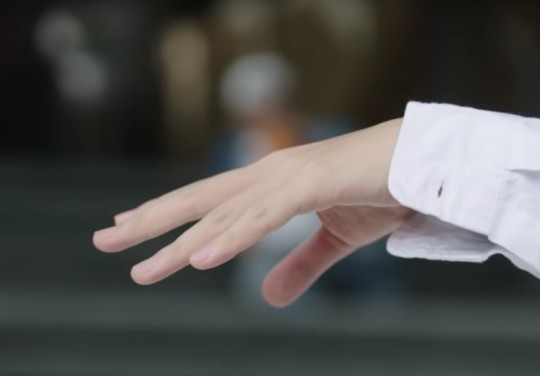
Pat’s encounter at the open staircase of the Architecture faculty is a scene with many layers of meaning, but perhaps one of the most heartwarming is that it can also be read as PatPran’s WEDDING in a way.
The orchestrated plan to take down faculty disapproval regarding PatPran’s relationship at first looked like the same kind of hazing that seniors put newcomers through, before allowing them into the fold. (The scene here echoes the freshie orientation in SOTUS, except that it’s the Architecture faculty, not Engineering.) And in the end it DOES fulfil that function, in so far as Archi disapproval is concerned. But somewhere along the way the scene also takes on the mantle of a Thai wedding ceremony – even Pat notices this and asks Pran why it’s like a khan maak at Ep.10 [1I4] 12:13. 😊
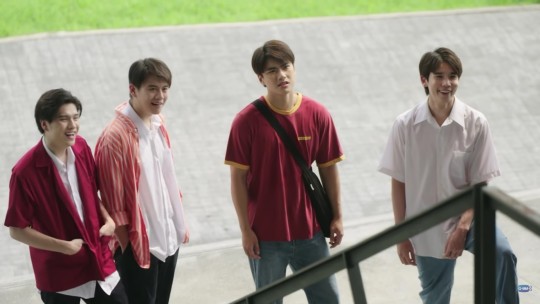
Thanks to the rambunctious, chatty and good-natured mob frequenting the comments section at the bottom of the Bad Buddy Series My Drama List webpage (shout out especially to PaMiKa, BenedictTan and Mermaid 👍) there is a link on there to Twitter (username: petalkiss) that helps clarify the scene.
According to Thai and Chinese traditions (let’s not forget Pat is Thai-Chinese and it’s suggested that Pran’s family is ethnic Thai/mixed), as part of the wedding ritual the groom visits the bride’s house (sometimes the hotel where the wedding will be held) and goes through a series of challenges, answering questions, shouting out declarations of love, etc., before he is deemed worthy enough and allowed to take the bride in marriage. (In Thailand this is actually considered part of the betrothal, but the wedding ceremony usually follows right after and both are seen as parts of one whole. In Chinese tradition, as far as I can tell, it's a precursor to the actual wedding ceremony, always on the day of the wedding itself.)
In the modern day the practice mostly involves a lot of light-hearted game-playing (sanuk in Thai, and known by many different names in mainland and diasporic Chinese communities) – all in the name of good fun, but this wedding custom (entertaining though it may be) has its roots in more archaic (and violent) times, when daughters were seen as weaker, precious things to be protected, and only allowed to be married off – often without much say in the matter – after the groom had proven himself worthy, paying a bride-price in the process (acknowledging her own worth, and the reality that her departure was also a loss for her family). And so she would go from the protection of her father’s house to that of another man’s – an idea that must sit uncomfortably in a lot of minds today. (Actually, I’m sensing that the directorial and screenwriting team also have some positive and supportive comments to make on strong women upending patriarchal restraints, with Pa and Dissaya leading the charge down the way blocked by Ming, but I will save that for another post.)
Setting their home lives aside for a bit, their faculties are also warring houses, and so we had Pran primly perched and isolated high above, waiting for pleading groom Pat to win over the patriarch of the Architecture family.
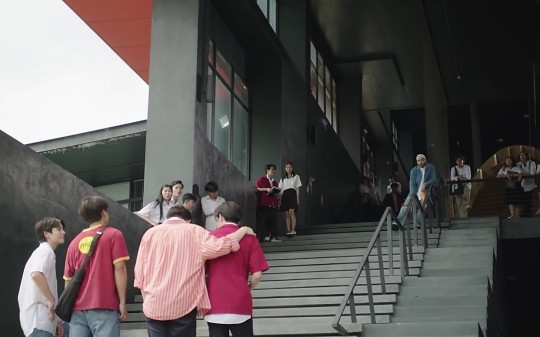
And it’s not surprising that Pat had to answer personal questions about Pran, shout out how much he loves him, and climb those mountainous steps to claim his beloved (although that romantic password reveal at Ep.10 [1I4] 11:40 was gasp-inducing in these troublesome times of personal data protection 🤣).
But it’s clear that Pran here is no powerless princess bride languishing passively in some ivory tower. Director Backaof and the talented screenwriters use this opportunity to throw some cold water on another BL trope (the meaningless role-gendering of male couples, accompanied by suggestions of imbalanced power dynamics). Whether or not the whole scene originated from Pran, it’s obvious he’s a key player and very much in control (from the phone call at Ep.10 [1I4] 8:30 and his knowing, cheeky smirks peppering the whole exchange, starting at Ep.10 [1I4] 9:52). Pat may have gone to the faculty like a knight in shining armor with Pran’s work file, but that was actually at sneaky Pran’s bidding, in service of a higher purpose.
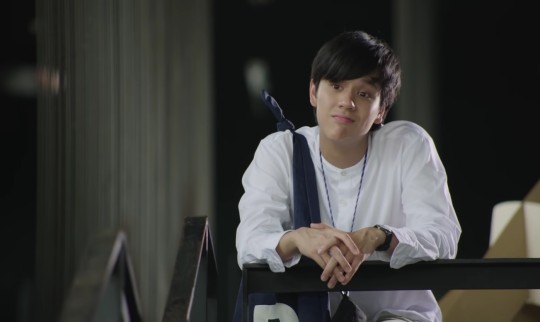
When it becomes evident that the scene has evolved into a commitment ceremony with Pat’s question at Ep.10 [1I4] 12:13, Pran takes over the narrative from senior Joke at Ep.10 [1I4] 12:20. (Anybody have any idea why Joke appears tipsy so early in the day though? He makes me think of the drunk best man leading toast after toast at a wedding banquet, woozily emceeing the proceedings until a saner, more sober individual has to take over. 😂 And any significance to his nickname?).
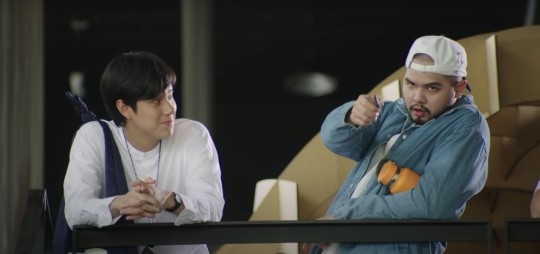
At this point we have PRAN stepping forward and issuing challenges directly to Pat – all at once he’s no longer the silent observer at his own wedding (unlike countless sequestered, voiceless brides in times past).
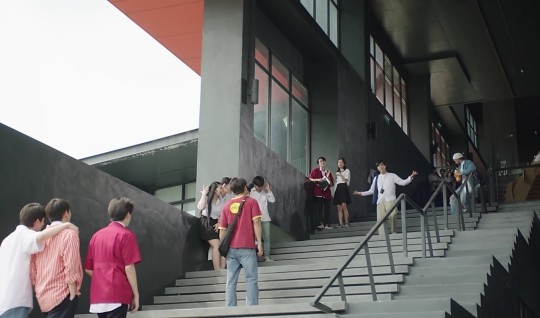
Then – significantly – they take steps toward each other on that staircase, and meet in the middle, signifying that this is a union of equals, where instead of rings, they seal the deal with the fist bump seen before at Ep.1 [4/4] 1.48 and Ep.6 [4/4] 8.35. And well we know – that fist bump showed how well-matched they were as rivals before, and it shows how well-matched they are as partners now. 😊
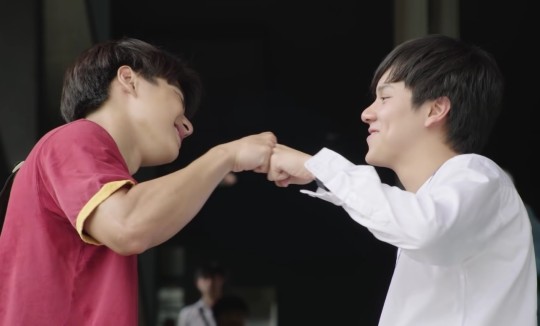
TLDR… ;)
This scene can be read in a number of ways – it subverted some patriarchal norms, stomped a bit more on some BL tropes, demolished faculty opposition to PatPran’s relationship using faculty hazing tradition, and also commented on wedding customs in the light of modern relationships. But the romantic in me can’t help but see it first and foremost as PatPran’s commitment ceremony, or wedding, call it what you will – the very public formalization of their heretofore informal love relationship in the eyes of society. 💖💖💖
[Afterpost Edit: It turns out that Pran’s peer mentor Joke does have some significance, and his name ties in with Pat’s password reveal. For the analysis, do check out this link here. 😉 And for WAI’s own wedding (sort of), do check out this link here.]
38 notes
·
View notes
Text
Compassion as the Root of Rage - Katara’s Depths [1/?]
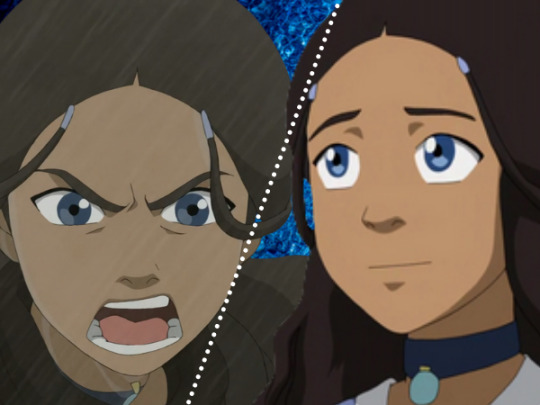
Anger vs Empathy - a dichotomy in Katara’s character?
There is an apparent contradiction in Katara’s character. On one side, we have the caring, motherly Katara, brimming with compassion rooted in her empathy and sensitivity. On the other side, there is a darkness, mainly manifest in her anger and rage. As you can tell by this meta’s title, I don’t buy that this is a contradiction. In fact, I’d argue that Katara’s compassion and rage are deeply intertwined - her compassion is causing her rage.
Taking a closer look at anger
Anger is an emotion of empowerment - when a boundary is (about to be) violated, when we feel fear or hurt, it takes us out of this powerlessness and into action. It is a protective feeling, and can be a force of justice, born of a strong sense of right and wrong.
“[...] denying this most natural and primal emotion is akin to attempting to extinguish a volcano: it will either die inside, killing a primal and vital part of your [...] nature, or, when least expected, it will erupt full force and destroy everything around it. And while this destruction may seem chaotic and ruthless, it is also transformative and regenerative [...].”
Syma Kharal, “Goddess Reclaimed”
Anger can be the driving force behind our activism, behind us standing up for ourselves and others, helping us face the demons that cause us pain and fear. I think you can only feel anger on behalf of another when you 1. have enough empathy to feel their pain, 2. have enough compassion to care about their pain, and you also need 3. the determination and confidence that you can change or better something if you express, act upon and make use of the anger. The first 2 are fulfilled with Katara almost all the time, and as she develops confidence, she also fulfills no. 3.
Mother, Healer & Warrior
The “Mother”, “Healer”, and “Warrior” are the archetypal forms relevant to Katara in her emotional interplay of compassion and rage.
As a culture, we want mothers to be nurturing, kind, giving, patient - all traits that Katara exhibits as an integral part of her character (she is obviously not an actual mother in the show but her motherly role in the Southern Water Tribe and in the GAang are made very clear, as are her motherly personality traits - and her, a teenage girl being expected to fill an adult role is pretty messed up but a bit more on that later / a lot more on that another time). But for the archetype of the Mother, her urge to protect her children/those in her care can obviously also lead to rage when they are threatened. Katara also exhibits rage on the behalf of those who have lost that inner fire for themselves, as we can see in “Imprisoned” when she helps the earth benders to regain hope and rise up.
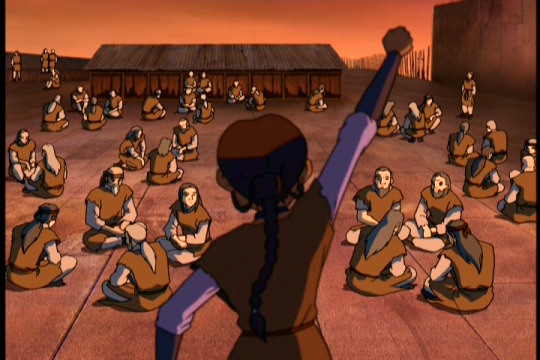
The Healer, driven by compassion, is a giving archetype as well, giving to others who are hurt emotionally, mentally or physically to ease their suffering and, well, heal their wounds. Katara’s capacity to heal through waterbending is one aspect of her embodiment of the Healer. She also heals in other ways, through giving comfort, support, kindness, and advice. A shadow of the Healer archetype is the tendency not to care for and give to the self in the way they care for and give to others. This is definitely an issue for Katara- she often prioritizes other people’s feelings above her own and receives little emotional support in return (until Zuko joins the group). She cries alone about her mother’s loss in the swamp, not “burdening” anyone else with her grief until it bursts to the surface in “The Southern Raiders”.
The warrior archetype is one of society’s protectors. Representative of physical strength and prowess, the warrior will stand up for the rights of others and for the things they believe in.
- “What is the Warrior Archetype? (Characteristics + Examples)” (knowyourarchetypes.com)
The Warrior uses her aggression as fuel to practice integrity in the world, to maintain or (re-)create what she values most. Katara’s lack of training as a waterbender at the beginning of season 1 frustrates her. She really wants to learn to fight, in order to protect what is dear to her in times of war, and actualize her potential as a master of waterbending (especially as a martial art). This leads to conflict in the Northern Water Tribe, where female waterbenders’ role is centered around healing, not fighting. Fuming about the sexism and injustice of being denied the ability to train to fight due to her gender, Katara challenges Master Pakku to a duel.
Katara’s Healer and Warrior aspects are two parts of the same whole - and both are needed in times of war, to decide the battles, care for the wounded, and ultimately restore peace.
Self-compassion in “The Southern Raiders”
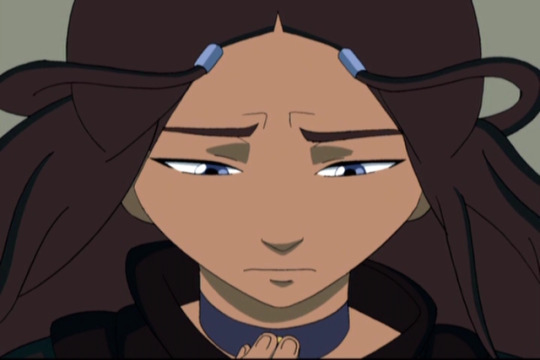
In “The Southern Raiders”, Katara finally confronts her terrible pain, grief and rage about the murder of her mother. As she stands before Yon Rha, the murderer, ready to take out all her suffering on him, to kill him- she decides against it. She needed to release her rage upon the one who caused it, needed to face the real possibility of killing him. She doesn’t forgive him. It is the episode where Katara’s pain finally takes center stage. This is not “only” justice on Kya’s behalf, or on the behalf of all the others who felt her loss, it is also very much a moment of justice for Katara. She had to fill the void left by her mother’s death, essentially taking up her role, if it wasn’t enough to deal with the grief. Her abscence ripped a hole into Katara’s life. In the context of our theme, confronting Yon Rha is a moment of self-compassion for Katara, of addressing her own suffering, her own trauma, and of caring enough to do something about it, without being deterred by others’ thoughts or feelings.
tl;dr / conclusion
Katara’s compassion is at the root of her rage, be it compassion for herself or for others. It expresses itself in her roles as motherly friend, healer, and warrioress. She cares fiercely, and she therefore protects fiercely, in a world torn apart by the injustices and horrors of war, full of threats to what she values.
#avatar: the last airbender#a:tla#the last airbender#katara#katara meta#avatar: the last airbender meta#meta#My posts#a:tla meta
51 notes
·
View notes
Photo

Winx Club Headcanons – Personality Traits and Magical Abilities
Flora Yasmin Virac, Linphea’s Guardian Fairy of Flowers
Flora is the middle child of three and the daughter of Alyssa and Rhodos Virac. Flora grew up in a residential community on the outskirts of the Lipheans capital city Marigold. Her parents were influential in the community, with her farther being the elected government official for her province in her early years. Floras mother was a stay at home parent who often helped out the community with menial tasks. Out of her family, Flora has the strongest magical core, and she is the only one capable of magical transformation. Due to her upbringing, she has a very strong sense of community and connectedness to her home province.
Flora did not grow up in an agricultural province, rather, she grew up in one of the most dangerous sections of the Linphean system. Her province is known for it’s dangerous landscape and plants, with both the flora and fauna known for eating trespassers and attacking unknown people. This environment made Flora extremely adventurous and capable. She is able to gain a quick and accurate knowledge of the environment around her and is able to quickly identify threats. In terms of her magical core, while it is stronger than most Linphean fairies, when she started at Alfea, she understood just how much work she would have to do to keep up. While Flora has a great understanding of her defensive abilities, she struggles to put out offensive spells. In the beginning this was something she struggled to overcome. However, she quickly realised that she had a talent for potion making. This was a skill she perfected so that she could create potions with enhanced her ability to both grow and manipulate plant life. Floras potion abilities have become a key part of her magical arsenal and have help boost both her powers and her confidence, her potion abilities have also made her the healer in the Winx Club. However, Floras main weakness is when there is no natural life or any way to create plant life. While this is not often an issue, there have been times were she has been rendered almost powerless due to the lack of life around her.
Flora is a very genuine person who is willing to give almost anyone the benefit of the doubt. She often, when first meeting her, comes of as shy and awkward, however, she is quick to open up and converse. She is extremely humble and prefers to give praise rather than receive it. Due to her kind nature, and her want for a sense of community, Flora is extremely social once she has opened up to people. She is a great listener, and is known for being the person to go to when someone has a problem. In the Winx Club, Flora is often described as the roots of the group, keeping everyone connected and grounded, especially in tough times.
#Winx#winx club#winx aesthetic#winx club headcanon#winx club headcanons#winx club edit#winx club flora#winx flora#winx edit
103 notes
·
View notes